- Undergraduate
- High School
- Architecture
- American History
- Asian History
- Antique Literature
- American Literature
- Asian Literature
- Classic English Literature
- World Literature
- Creative Writing
- Linguistics
- Criminal Justice
- Legal Issues
- Anthropology
- Archaeology
- Political Science
- World Affairs
- African-American Studies
- East European Studies
- Latin-American Studies
- Native-American Studies
- West European Studies
- Family and Consumer Science
- Social Issues
- Women and Gender Studies
- Social Work
- Natural Sciences
- Pharmacology
- Earth science
- Agriculture
- Agricultural Studies
- Computer Science
- IT Management
- Mathematics
- Investments
- Engineering and Technology
- Engineering
- Aeronautics
- Medicine and Health
- Alternative Medicine
- Communications and Media
- Advertising
- Communication Strategies
- Public Relations
- Educational Theories
- Teacher's Career
- Chicago/Turabian
- Company Analysis
- Education Theories
- Shakespeare
- Canadian Studies
- Food Safety
- Relation of Global Warming and Extreme Weather Condition
- Movie Review
- Admission Essay
- Annotated Bibliography
- Application Essay
- Article Critique
Article Review
- Article Writing
- Book Review
- Business Plan
- Business Proposal
- Capstone Project
- Cover Letter
- Creative Essay
- Dissertation
- Dissertation - Abstract
- Dissertation - Conclusion
- Dissertation - Discussion
- Dissertation - Hypothesis
- Dissertation - Introduction
- Dissertation - Literature
- Dissertation - Methodology
- Dissertation - Results
- GCSE Coursework
- Grant Proposal
- Marketing Plan
- Multiple Choice Quiz
- Personal Statement
- Power Point Presentation
- Power Point Presentation With Speaker Notes
- Questionnaire
- Reaction Paper
- Research Paper
- Research Proposal
- SWOT analysis
- Thesis Paper
- Online Quiz
- Literature Review
- Movie Analysis
- Statistics problem
- Math Problem
- All papers examples
- How It Works
- Money Back Policy
- Terms of Use
- Privacy Policy
- We Are Hiring

Steve Jobs, Essay Example
Pages: 5
Words: 1364
Hire a Writer for Custom Essay
Use 10% Off Discount: "custom10" in 1 Click 👇
You are free to use it as an inspiration or a source for your own work.
Among all business leaders in recent times, Steve Jobs is arguably the best example of the fact that perseverance commands success. Steve Jobs was considered a difficult boss at Apple before he was ousted but when he returned, there was little change in his leadership style. This demonstrates that Jobs always remained true to himself whether others approved of his leadership style or not. Jobs might not have been a likeable person on a personal level but he was authentic.
Even though we often hear about the virtues of democratic leadership style as it motivates employees and improves communication between leaders and subordinates, Jobs ruled in an autocratic manner. No wonder, Fortune magazine called him one of the leading egomaniacs in the Silicon Valley (Williams, 2012). When Jobs started his second term at Apple, he was not happy with one of the shipping company. He asked them to be faster with delivery but they refused since their service was already in accordance with the agreed upon terms. He directed his manager to break the contract despite manager’s objection that it would lead to costly lawsuit which did happen eventually (Austen, 2012). Author Andrew Keen wrote in his book The Cult of the Amateur that there is not an ounce of democracy at Apple and without Jobs’ authoritarian leadership, Apple would be just another Silicon Valley outfit (Chaudhuri, 2012). Jobs would be involved in all the details and hired like-minded people (Branson, 2011). But he still drew admiration because he personally demonstrated what he said. He didn’t only preach innovation but practiced it himself.
Steve Jobs also subscribed to Herzberg’s ‘Theory X’ according to which workers are lazy and need guidance. This should not imply that Apple’s employees were lazy and incapable but only that Jobs’ approach reflected his pursuit for perfection. Jobs often reiterated that Apple’s mission was to build the best products in the industries it competes in. This is he micromanaged his employees and no product left the company’s door without his approval.
Steve Jobs was also a transformational leader. When he re-joined the company, Apple was waiting to join the list of extinct companies (Chakrabortty, 2011). Jobs didn’t only save the company but also made it into one of the most admired companies, with a loyal customer base that most other companies only dream of. Jobs’ subordinates believed in him because they knew he was passionate about the company and the products it delivered to the market. They also witnessed Jobs’ obsession with quality and, thus, became motivated themselves to deliver the best products to consumers.
Steve Jobs was not afraid to think outside the box and he encouraged his subordinates to do the same. In fact, the company’s original motto was “Think Different”. Steve Jobs was not only transformational but also visionary. Effective leaders scan the external environment to look for emerging trends but Jobs told the consumers what the trends should be (Verganti, 2011). He singlehandedly redefined several industries including smart phones, portable music players, and tablet computing.
Steve Jobs might not have been great at human relationships but he did believe in his people and pushed them to do their best. An effective leader understands that people are one of the company’s best assets and he invests in them. Despite Jobs’ cold treatment of his subordinates, one would rarely read about Apple’s best employees leaving the company which is a proof of the fact that Jobs’ subordinates also believed in their leader and admired his pursuit of perfection.
Jobs was also a successful leader because he understood the strengths of his company and focused on few things Apple could do really well instead of trying to be everything. Jobs knew that the reputation of the company is built on ‘innovation’ and ‘quality’ and Apple can only defend its reputation by doing few things doing them really well. On annual retreats, Jobs would ask his subordinates to recommend ten products and would eventually shortlist them to only three. When Google’s new CEO Larry Page visited Jobs, Jobs advised him to focus on only five products Google could do really well and get rid of the rest (Isaacson, 2012). This also teaches us that Jobs didn’t overestimate his own or Apple’s capabilities and focused on utilizing limited resources efficiently.
One of the most important qualities of an effective leader is to provide direction to their employees and ensure everyone is working towards the same objectives. Every employee at Apple knew where Jobs was taking the company and they also knew what Jobs expected from them. Apple’s employees were also willing to trust Jobs’ judgments and vision because he had proven himself right time and time again. Jobs didn’t only held legitimate power that came from being the company’s CEO but also expert power over his subordinates.
Steve Jobs might not have the most friendly communication style but his direct communication style did prevent miscommunication. Jobs was known to be blunt and straight forward and he himself admitted, “If something sucks, I tell people to their face, It’s my job to be honest.” (Pullen, 2012). Jobs got away with his abrasive communication style because he commanded respect and admiration from his followers but he did demonstrate the importance of clear communication so that there are no misunderstandings and subordinates know exactly what their leaders expect from them.
Another reason why Jobs was a successful leader is that employees at Apple were given roles that made the best use of their specific strengths and abilities. Thus, there was a good fit between their responsibilities and capabilities. In addition, Apple hired people who were a good fit to the organizational culture. As a result, the employee turnover was low because the new recruits also believed in the company’s mission (McInerney, 2011).
Steve Jobs has cemented his place as one of the most inspirational leaders of all times but that doesn’t mean his leadership style can be successfully adopted by anyone. This is because Job’s leadership style was situational. When he returned to the company, it had no vision and proper strategy in place and everyone had given up on the company. Jobs not only provided everyone with a vision but also won their loyalty and admiration through passion for the company and its products as well as by delivering results. This is why his ordinates even kept up with his cold temper because they shared his vision and they trusted him (Henson, 2011).
Steve Jobs had unconventional leadership style but he still enjoyed high levels of loyalty because of his commitment to the company and his impressive track. Jobs also gave his subordinates a clear vision and made sure that everyone in the company was compatible with the company’s culture. He also understood his company well and demonstrated through commitment to few products that quality and innovation were central to the company’s mission. He pushed his employees to do their best and gave them responsibilities that suited their strengths and abilities. In addition, he was also straight forward with his employees so they also knew what their leader wanted from them and what he liked or disliked.
Austen, B. (2012, July 23). The Story of Steve Jobs: An Inspiration or a Cautionary Tale? Retrieved October 18, 2012, from http://www.wired.com/business/2012/07/ff_stevejobs/all/
Branson, R. (2011, October 7). True business leaders think differently . Retrieved October 18, 2012, from http://www.virgin.com/richard-branson/blog/true-business-leaders-think-differently
Chakrabortty, A. (2011, January 24). CEOs like Steve Jobs style themselves as messiahs, not mere managers. But that’s just an excuse to rake it in . Retrieved October 18, 2012, from http://www.guardian.co.uk/commentisfree/2011/jan/25/chief-executives-coin-it-as-messiahs
Chaudhuri, A. (2012, April 26). Authoritarian leadership, the secret behind Steve Jobs success! Retrieved October 18, 2012, from http://www.thesundayindian.com/en/story/authoritarian-leadership-the-secret-behind-steve-jobs-success/33963/
Henson, R. (2011, November 1). Faculty Insight: The Leadership of Steve Jobs . Retrieved October 18, 2012, from http://business.rutgers.edu/news/faculty-insight-leadership-steve-jobs
Isaacson, W. (2012, April). The Real Leadership Lessons of Steve Jobs . Retrieved October 18, 2012, from http://hbr.org/2012/04/the-real-leadership-lessons-of-steve-jobs/ar/1
McInerney, S. (2011, October 7). Steve Jobs: an unconventional leader . Retrieved October 18, 2012, from http://www.smh.com.au/executive-style/management/steve-jobs-an-unconventional-leader-20111007-1lcmo.html
Pullen, J. P. (2012, May 18). Jobs or Zuckerberg: Who’d Make the Better Boss? Retrieved October 18, 2012, from http://www.entrepreneur.com/article/223570#
Verganti, R. (2011, October 7). Steve Jobs and Management by Meaning . Retrieved October 18, 2012, from http://blogs.hbr.org/cs/2011/10/steve_jobs_and_management_by_m.html
Williams, R. (2012, April 12). Why Steve Jobs is not a leader to emulate . Retrieved October 18, 2012, from http://business.financialpost.com/2012/04/12/steve-jobs-is-not-a-leader-to-emulate/
Stuck with your Essay?
Get in touch with one of our experts for instant help!
Dubai, Essay Example
Nurse-Led Approach to Diabetic Retinal Screening, Article Review Example
Time is precious
don’t waste it!
Plagiarism-free guarantee
Privacy guarantee
Secure checkout
Money back guarantee

Related Essay Samples & Examples
Voting as a civic responsibility, essay example.
Pages: 1
Words: 287
Utilitarianism and Its Applications, Essay Example
Words: 356
The Age-Related Changes of the Older Person, Essay Example
Pages: 2
Words: 448
The Problems ESOL Teachers Face, Essay Example
Pages: 8
Words: 2293
Should English Be the Primary Language? Essay Example
Pages: 4
Words: 999
The Term “Social Construction of Reality”, Essay Example
Words: 371
- Call to +1 844 889-9952
Steve Jobs as a Model in Business and Management
Many people forget that it takes more than a dream to make success a reality. Inspiration is a very important part of the life of a human being. Times do get tough. However, the stories of people who overcame immense adversity to become some of the most successful figures in the world serve as motivational focal points for many individuals.
Similarly, the stories of multi-billion corporations that started from garages and studio apartments, as well as college dropouts who everyone thought would amount to nothing, are very inspirational to upcoming individuals in different facets of life. Apple Inc. is a company with one such success story. Its co-founder, the late Steve Jobs, is, without doubt, my role model in the business and management world.
Mr. Jobs overcame major challenges and extreme adversities in his life to become the CEO of one of the largest technology companies in the world (Lemke, 2007). Even after his death, his legacy lives on with Apple Inc. retaining its status as a technological giant in the world (Kahney, 2009). In this paper, I am going to analyze the story of Steve Jobs in a bid to establish him as my role model of choice in the business and management world and in life in general.
Mr. Jobs’ childhood was less than ideal. Born on February 24th, 1955, his biological parents, a teaching assistant from Syria, Mr. Abdulfattah Jandali, and a Wisconsin graduate student, Ms. Joanne Schieble, could not take care of him (Melby, 2012). They gave him up for adoption with instructions that his future parents should be college graduates. However, things did not go according to plan and the placement failed to go through.
The baby was placed under the care of Paul Jobs, a man who had dropped out of high school. The man had quit the coastguard after placing a bet with his mates that he could find a wife in 14 days. Paul was married to Clara Hagopian after ten days of his quitting his job. Steve Jobs was raised in a typical family setting. However, the community he grew up in was less than typical.
Silicon Valley, a 700-acre industrial park located on the Stanford University land, was developing fast (Kahney, 2009). The park offered an opportunity for private companies to commercialize technology developed at the university. Companies like the Lockheed Missiles, Space Division, and NASA Ames Research Centre surrounded Jobs’ life.
Similarly, technology gurus like Gordon Moore and William Shockley were available to Jobs at his childhood. In fact, even the people perceived as failures in that society were likely to be engineers. The surroundings notwithstanding, one thing changed the life of Steve Jobs at the age of six. A girl from across the street mentioned to him that the reason for his adoption was that his real parents did not want him (Elliot, 2012).
Jobs did not take this lightly. The frantic efforts by his adopted parents to convince him that they handpicked him as their son were futile. From then onwards, Jobs wanted special treatment, a trait he carried with him to his deathbed (Jobs & Beahm, 2011). Jobs also developed reflexive cruelty towards some people. He had a lot of respect for Paul Jobs, the man who taught him to be an artisan.
One special trait that Jobs possessed was the ability to connect with engineers. He could understand them easily and this led to a realization by both himself and his parents that he was extremely bright. His parents tried very hard to help him maximize his potential. They enrolled him in good schools and kept teaching him new things (Isaacson, 2011).
However, Jobs did not like teachers. They thought of him as an arrogant troublemaker since he expected everybody to tend to his needs. His ability to connect with engineers got him into Hewlett Packard Explorers Club. Here, Jobs saw his first computer. At that time, he was quite passionate about working with technology. His exposure to a computer further increased his curiosity and urge. He made contacts at HP and could even ask Bill Hewlett for parts when he was building a frequency counter.
At age 16, Jobs was introduced to Steve Wozniak. The latter shared Jobs’ passion for technology and was only five years older than he was. When Wozniak came up with a hacking tool for the phone system, one that allowed them to make calls to places like the Vatican free of charge, Jobs suggested that they should sell the device (Elliot, 2012).
At this point, they had impressed other technology enthusiasts. As a result, it was easy for them to sell the device. They sold almost one hundred units before closing down operations after thugs robbed them at gunpoint.
It is clear that Steve Jobs did not have it easy. He faced challenge after challenge in his journey to success and at a very tender age. The challenges notwithstanding, he was not derailed from his vision and goals. Instead, the challenges catapulted him to greater heights (Mattern, 2013). The challenges he faced made him even more aggressive. It is a great character trait in business and management. I would like to learn this trait from the technology legend.
Resilience and the ability to move forward despite the challenges one is facing is a quality not found in many, although it can lead to great success. On the other hand, there are some negative traits to Steve Jobs, which I would not like to pick up. Arrogance and disregard for authority are self-destructive character traits that Steve Jobs possessed (Kahney, 2009). Similarly, it is impossible for everyone to treat you as special.
In addition, it is important for human beings to find ways to deal with the emotional trauma they went through during their childhood. Steve Jobs did not deal with this trauma. Rather, he showed reflexive cruelty to some people. Although no person is perfect, it is important for people to pick up positive aspects of life even when trying to learn from their role models and mentors. One should identify the things they do not like about their role models and mentors and stay away from them.
Steve Jobs did not want to go to college. However, his parents pledged to give him a chance to possess a college education. Eventually, he joined the Reed College of liberal arts in Portland, Oregon. Considering that it was a private college, Reed was very expensive. His parents stretched their finances to put him through college. Nevertheless, Jobs showed very little appreciation. Although he regretted this move later in life, it was very insensitive and inconsiderate of him (Sheen, 2010).
Jobs did not last for long at Reed College. He concluded that he was wasting his parents’ money at the school and dropped out. However, the administration allowed him to stay on campus and attend the lectures that interested him. During this time, he lived a rather unenviable life. He walked barefoot most of the time and lived in a garage apartment that had no heat. He was also a consumer of LSD (Isaacson, 2011). Jobs then moved back home to commence his search for work, which was not a problem at all because of the tech boom.
As a result, he became one of the first fifty employees at Atari. Here, he conflicted with his fellow employees due to his behavior and abrasive personality (Kahney, 2009). It got to a point where people wanted him fired. In 1973, he quit Atari and headed to India in pursuit of enlightenment. On his return to the States, Jobs had learned the importance of intuition as compared to intellect in the development and success of an individual.
The Apple concept came to Jobs as he worked on an apple orchard in Oregon. Wozniak developed the first Apple product alone. Jobs contributed by offering his knowledge about the market and the opportunity created by a circuit board that his friend had designed in 1975. While Wozniak was mainly motivated by the love of technology in his innovations, Jobs’ main motivation was money (Elliot, 2012).
The two launched Apple Computer on 1st April 1976 with a capital of $1300. Jobs turned his family garage into a factory for Apple 1 circuit boards. The two partners shared the desire to develop a more advanced form of technology, but they knew that it would require more capital.
They attempted to sell the company but failed, prompting a former Intel millionaire to invest $250,000 and create a business plan that would move Apple to greater heights (Hunter, 2012). From this point onwards, Apple began an upward climb to success. The upward trend is still there to date. The two continued to produce quality products to suit the need of their clientele, a trend that is going on to date (Isaacson, 2011).
Steve Jobs ran into trouble with the company he helped create. People were uncomfortable with his management style and his body odor (Elliot, 2012). In numerous occasions, Jobs used his position at Apple to steal the thunder from a new product. He also made a rushed decision for Apple to venture into the phone business that he almost sank the company. At some point, the board of the company decided to remove him as CEO of the entity. He came back as a consultant and later as CEO after a long legal battle.
The main reason why Steve Jobs is my role model in the management and business field, despite his numerous shortcomings, is his undoubted ability to learn from his experiences and surroundings. He also possessed the ability to identify business niches with ease. Such are great qualities in the management and business world.
It is also important to note the numerous times Jobs got up after fate knocked him down, not to mention the many times he went against the wishes of people in pursuit of his dreams. He brought a very entrepreneurial mind to the Apple Company. Such a mind sent is arguably the reason why Apple has flourished over the years and has achieved immense success in the technological world.
I disqualified Andy Wong of 3M Optical Systems from the list of my role models because the success of the company he founded is not close to the success achieved by Apple Inc. I also eliminated Ingvar Kamprad of IKEA from my list. The reason is that I feel the CEO’s position at Apple Inc. required more managerial skills than anything IKEA could offer or demand from Ingvar.
I disqualified Ian Telford due to the exploitative and cutthroat competition nature of the chemical industry he established. Sam Palmisano, in my opinion, could have done more with the IBM brand than he did. As such, Jobs overtook him as my role model. Jeffrey Immelt of General Electric has not achieved as much success as Steve Jobs in the management and business world. The above are the reasons why I disqualified the personalities from the list of my role models.
It is a fact that Andy Wong of 3M Optical Systems, Ingvar Kamprad of IKEA, Sam Palmisano of IBM, Ian Telford of Dow Chemical, and Jeffrey Immelt of General Electric are great individuals who have done a lot to be recognized in the business world. However, Steve Jobs is an individual who overcame adversity and the difficulties of life to emerge a victor. Therefore, in my opinion, he beats them for the first slot as my role model.
I have learned, from the Jobs story, that It is crucial for any business to uphold honesty, ethical standards, and transparency in its dealings. Such traits ensure continuity of the business and good relations between partners, employers, and employees. Steve Jobs was a phenomenal manager and a great influence about the success of Apple Inc. (Gregory, 2013).
However, it is important for managers not to let success or personal issues cloud their better judgment or jeopardize the operations of their companies. It is a lesson well inferred from the experiences of Steve Jobs. Overall, I view Steve Jobs as the best role model in the business and management world and life in general.
Elliot, J. (2012). Leading Apple with Steve Jobs: Management lessons from a controversial genius . Hoboken, N.J.: Wiley.
Gregory, J. (2013). Steve Jobs . Danbury, Conn.: Children’s Press.
Hunter, N. (2012). Steve Jobs . Chicago, Ill.: Heinemann Library.
Isaacson, W. (2011). Steve Jobs . New York: Simon & Schuster.
Jobs, S., & Beahm, G. W. (2011). I, Steve Jobs, in his own words . Chicago, Ill.: B2 Books.
Kahney, L. (2009). Inside Steve’s brain: Business lessons from Steve Jobs, the man who saved Apple . London: Atlantic.
Lemke, D. B. (2007). Steve Jobs, Steve Wozniak and the personal computer . Mankato, Minn.: Capstone Press.
Mattern, J. (2013). Steve Jobs . New York: Children’s Press.
Melby, C. (2012). The Zen of Steve Jobs . Hoboken, N.J.: John Wiley & Sons.
Sheen, B. (2010). Steve Jobs . Detroit, MI: Lucent Books.
Cite this paper
Select style
- Chicago (A-D)
- Chicago (N-B)
BusinessEssay. (2021, December 18). Steve Jobs as a Model in Business and Management. https://business-essay.com/steve-jobs-as-a-model-in-business-and-management/
"Steve Jobs as a Model in Business and Management." BusinessEssay , 18 Dec. 2021, business-essay.com/steve-jobs-as-a-model-in-business-and-management/.
BusinessEssay . (2021) 'Steve Jobs as a Model in Business and Management'. 18 December.
BusinessEssay . 2021. "Steve Jobs as a Model in Business and Management." December 18, 2021. https://business-essay.com/steve-jobs-as-a-model-in-business-and-management/.
1. BusinessEssay . "Steve Jobs as a Model in Business and Management." December 18, 2021. https://business-essay.com/steve-jobs-as-a-model-in-business-and-management/.
Bibliography
BusinessEssay . "Steve Jobs as a Model in Business and Management." December 18, 2021. https://business-essay.com/steve-jobs-as-a-model-in-business-and-management/.
- Dell Company Change Management
- EasyJet Airline Company Change Management
- Auto Parking Business Project
- Emirates NBD Company Strategies
- Nintendo Company Strategy
- Hawk Car Company’s Organisation and Behaviour
- Alibaba Company and Counterfeit Goods Issue
- Pfizer Inc.’s Strategic and Operational Planning
- “Wal-Mart’s $288 Billion Meeting” Article by Schlender
- Apple Inc.’s Supply Chain, Ethics, and Governance
October 24, 2011
Steve Jobs: A Genius, Yes; A Role Model for the Rest of Us, No Way
By Gary Stix
This article was published in Scientific American’s former blog network and reflects the views of the author, not necessarily those of Scientific American
The nearly three weeks since Steve Jobs’s death has been like an extended tribute to the first global head of state. The memorial ceremonies worldwide, the special commemorative issues and, today, the release of Walter Isaacson’s Steve Jobs , all bear testament to the Apple founder’s legacy. Jobs deserved it. As Isaacson pointed out on CBS's 60 Minutes last night , Jobs transformed personal computers, telephones, even retail stores, among others—and he would have probably taken on television, if he had lived long enough.
Many heads of state assuredly do not merit such eulogies. Gaddafi is dead. And when the Turkmens turned out to mourn Saparmurat Atayevich Niyazov in 2006, they were probably secretly celebrating at least the recovery of the month of January, as Niyazov had renamed the first month of the year after his personal honorific, Türkmenbaşy.
One thread among the encomiums suggests that the world would be a better place if we just had more Steve Jobs in high places. Consider this from Thomas Friedman: “The melancholy over Steve Jobs’s passing is not just about the loss of the inventor of so many products we enjoy. It is also about the loss of someone who personified so many of the leadership traits we know are missing from our national politics.”
On supporting science journalism
If you're enjoying this article, consider supporting our award-winning journalism by subscribing . By purchasing a subscription you are helping to ensure the future of impactful stories about the discoveries and ideas shaping our world today.
It would be unfortunate if the remembrance of Jobs spawns a legion of Steve wannabes. Jobs, in geekspeak, was an “N of 1.” Jobs’s perfectionism and design sense helped establish Apple's signature “iBrands,” but these traits also transcended, to some extent, a toxic personality that could have served as a model for the Kevin Spacey character in the movie " Horrible Bosses ." In the film, Dave Harken implies that a promotion awaits one of his employees but ends up awarding it to himself. The Jobs equivalent: stiffing early Apple employees out of stock options when the company first went public. The guy was a…
In the weeks since his death, Jobs has been compared to Einstein and Edison. Maybe so. But the problem with using his interpersonal style as a management role model is that the rest of us , to parrot Apple advertising, will assuredly blow it. In business, the control freak boss—the emblematic Jobs model—is a recipe for unintentionally delivering your best employees as new hires to your closest competitors.
Millions of people have to manage others, and this challenge doesn’t necessarily bring out the best in us. A 2005 article by two psychologists from the University of Surrey, " Disordered Personalities at Work ," found that senior British executives were more likely to demonstrate histrionic personality disorder (grandiosity and lack of empathy among other traits) than criminal psychiatric patients at Broadmoor Special Hospital in Berkshire, England, and they were equally likely to show narcissistic (perfectionism and a dictatorial bent) and compulsive tendencies. Is it that this type of person is attracted to the job or the workplace encourages this type of behavior? Who knows? But entreating subordinates to “insanely great” levels of performance, to quote Jobs’s hyperbolic rhetoric, is more likely to initiate a collective bargaining drive than produce the next iPad.
Even Jobs may have been at his best when he left behind the persona of the old Steve. New Yorker writer James Surowiecki and author of The Wisdom of Crowds : Why the Many Are Smarter Than the Few and How Collective Wisdom Shapes Business, Economies, Societies and Nations, noted in that magazine how Jobs loosened up in recent years on his insistence on totally closed architectures. The old Steve might have forbidden MP3s on iPods and apps for iPhones and iPads. Giving up a modicum of control eventually propelled the company to heights it had never before experienced—and cemented Jobs's legacy in the most histrionic terms imaginable.
Source: Wikimedia Commons
- Share full article
Advertisement
Supported by
Reaping the Rewards 0f Risk-Taking
By Steve Lohr
- Aug. 27, 2011
SINCE Steven P. Jobs resigned as chief executive of Apple last Wednesday, much has been said about him as a peerless corporate leader who has created immense wealth for shareholders, and guided the design of hit products that are transforming entire industries, like music and mobile communications.
All true, but let’s think different, to borrow the Apple marketing slogan of years back. Let’s look at Mr. Jobs as a role model.
Above all, he is an innovator. His creative force is seen in products like the iPod, iPhone and iPad, and in new business models for pricing and distributing music and mobile software online. Studies of innovation come to the same conclusion: you can’t engineer innovation, but you can increase the odds of it occurring. And Mr. Jobs’s career can be viewed as a consistent pursuit of improving those odds, both for himself and the companies he has led.Mr. Jobs, of course, has enjoyed singular success. But innovation, broadly defined, is the crucial ingredient in all economic progress — higher growth for nations, more competitive products for companies, and more prosperous careers for individuals. And Mr. Jobs, experts say, personifies what works in the innovation game.
“We can look at and learn from Steve Jobs what the essence of American innovation is,” says John Kao, an innovation consultant to corporations and governments.
Many other nations, Mr. Kao notes, are now ahead of the United States in producing what are considered the raw materials of innovation. These include government financing for scientific research, national policies to support emerging industries, educational achievement, engineers and scientists graduated, even the speeds of Internet broadband service.
Yet what other nations typically lack, Mr. Kao adds, is a social environment that encourages diversity, experimentation, risk-taking, and combining skills from many fields into products that he calls “recombinant mash-ups,” like the iPhone, which redefined the smartphone category.
“The culture of other countries doesn’t support the kind of innovation that Steve Jobs exemplifies, as America does,” Mr. Kao says.
Workers of every rank are told these days that wide-ranging curiosity and continuous learning are vital to thriving in the modern economy. Formal education matters, career counselors say, but real-life experience is often even more valuable.
An adopted child, growing up in Silicon Valley, Mr. Jobs displayed those traits early on. He was fascinated by electronics as a child, building Heathkit do-it-yourself projects, like radios.

Mr. Jobs dropped out of Reed College after a semester and trekked around India in search of spiritual enlightenment, before returning to Silicon Valley to found Apple with his friend, Stephen Wozniak, an engineering wizard. Mr. Jobs was forced out of Apple in 1985, went off and founded two other companies, Next and Pixar, before returning to Apple in 1996 and becoming chief executive in 1997.
His path was unique, but innovation experts say the pattern of exploration is not unusual. “It’s often people like Steve Jobs who can draw from a deep reservoir of diverse experience that generate breakthrough ideas and insights,” says Hal B. Gregersen, a professor at the European Institute of Business Administration, or Insead.
Mr. Gregersen is a co-author of a new book, “The Innovator’s DNA” (Harvard Business School Press), based on an eight-year study of 5,000 entrepreneurs and executives worldwide. His two collaborators and co-authors are Jeff Dyer, a professor at Brigham Young University, and Clayton M. Christensen, a professor at the Harvard Business School, whose 1997 book “The Innovator’s Dilemma” popularized the concept of “disruptive innovation.”
The academics identify five traits that are common to the disruptive innovators: questioning, experimenting, observing, associating and networking. Their bundle of characteristics echoes the ceaseless curiosity and willingness to take risks noted by other experts. Networking, Mr. Gregersen explains, is less about career-building relationships than a search for new ideas. Associating, he adds, is the ability to make idea-producing connections by linking concepts from different disciplines — intellectual mash-ups.
“Innovators engage in these mental activities regularly,” Mr. Gregersen says. “It’s a habit.”
Innovative companies, according to the authors, typically enjoy higher valuations in the stock market, which they call an “innovation premium.” It is calculated by estimating the share of a company’s value that cannot be accounted for by its current products and cash flow. The innovation premium tries to quantify investors’ bets that a company will do even better in the future because of innovation.
Apple, by their calculations, had a 37 percent innovation premium during Mr. Jobs’s first stint with the company. His years in exile resulted in a 31 percent innovation discount. After his return, Apple’s fortunes improved gradually at first, and improved markedly starting in 2005, yielding a 52 percent innovation premium since then.
There is no conclusive proof, but Mr. Gregersen says it is unlikely that Mr. Jobs could have reshaped industries beyond computing, as he has done in his second stint at Apple, without the experience outside the company, especially at Pixar — the computer-animation studio that created a string of critically and commercially successful movies, like “Toy Story” and “Up.”
Mr. Jobs suggested much the same thing during a commencement address to the graduating class at Stanford in 2005. “It turned out that getting fired from Apple was the best thing that could have ever happened to me,” he told the students. Mr. Jobs also spoke of perseverance. “Sometimes life hits you in the head with a brick,” he said. “Don’t lose faith.”
Mr. Jobs ended his commencement talk with a call to innovation, in one’s choice of work and in life. Be curious, experiment, take risks, he said. His admonition was punctuated by the words on the back of the final edition of “The Whole Earth Catalog,” which he quoted: “Stay hungry. Stay foolish.”
“And,” Mr. Jobs said, “I have always wished that for myself. And now, as you graduate to begin anew, I wish that for you.”
- SUGGESTED TOPICS
- The Magazine
- Newsletters
- Managing Yourself
- Managing Teams
- Work-life Balance
- The Big Idea
- Data & Visuals
- Reading Lists
- Case Selections
- HBR Learning
- Topic Feeds
- Account Settings
- Email Preferences
Steve Jobs and Management by Meaning
- Roberto Verganti
Steve Jobs has always been considered an anomaly in management; his leadership style was something to admire or to criticize, but definitely not to replicate. He did not fit into the frameworks of business textbooks: there was orthodox management, and then there was Steve Jobs. The reason why institutional management theories have always looked at […]
Steve Jobs has always been considered an anomaly in management; his leadership style was something to admire or to criticize, but definitely not to replicate. He did not fit into the frameworks of business textbooks: there was orthodox management, and then there was Steve Jobs.
- Roberto Verganti is a professor of leadership and innovation at the Stockholm School of Economics and a visiting lecturer at Harvard Business School. He is the author of Overcrowded: Designing Meaningful Products in a World Awash with Ideas and Design Driven Innovation: Changing the Rules of Competition by Radically Innovating What Things Mean .
Partner Center
Steve Jobs Speech Analysis Essay
Introduction.
Steve Jobs’ speech to students at Stanford University is still considered one of the most iconic and significant in history. It is imbued with the spirit of creativity and cleverness of a man who has seen and experienced so much in his life. It is something he wants to share, one of the most valuable materials imaginable, namely experience. In his speech, he draws on the personal situations that have occurred throughout Jobs’ life, as well as the conclusions he has come to over time (Jobs). This essay concentrates on how this speech uses logos and how influential it is for other people.
He tells the stories in his speech, essentially retelling his biography and life. It is filled not only with fantastic events and entanglements but also with inspiration, something students sometimes lack for the sake of advancing in the future. It also touches on the companies he has worked for or helped found. Jobs’ whole life can be described as something out of the blue that only some are capable of doing. It was this speech that was able to inspire a large number of students to accomplish things, allowing them not to despair in themselves and to seek their personal destiny in this world.
This speech showed the greatness of Steve Jobs, being a role model, whose views made a breakthrough in every industry he touched according to the words of the students listening to it. That is the definition of how great a man is and how much he is revered, even after a long time. Jobs was a genius who put meaning into his every move, making him a unique and distinctive designer and an inspiration for others. The way of interaction using words is influential and provides a vast amount of information in minutes.
Jobs, Steve. “ How to Live before You Die .” Ted.com , TED Talks, 2011, Web.
- Chicago (A-D)
- Chicago (N-B)
IvyPanda. (2023, December 13). Steve Jobs Speech Analysis. https://ivypanda.com/essays/steve-jobs-speech-analysis/
"Steve Jobs Speech Analysis." IvyPanda , 13 Dec. 2023, ivypanda.com/essays/steve-jobs-speech-analysis/.
IvyPanda . (2023) 'Steve Jobs Speech Analysis'. 13 December.
IvyPanda . 2023. "Steve Jobs Speech Analysis." December 13, 2023. https://ivypanda.com/essays/steve-jobs-speech-analysis/.
1. IvyPanda . "Steve Jobs Speech Analysis." December 13, 2023. https://ivypanda.com/essays/steve-jobs-speech-analysis/.
Bibliography
IvyPanda . "Steve Jobs Speech Analysis." December 13, 2023. https://ivypanda.com/essays/steve-jobs-speech-analysis/.
- “Farewell Address” by George Washington
- Retelling as a Literacy Assessment
- The Role of the United States in World War II
- Herman Melville’s Billy Budd, Sailor: A Retelling of the Story of Jesus’ Crucifixion
- Steve Jobs’ Stanford Speech Rhetorical Strategies
- Deception Role in "The Odyssey" by Homer
- Steve Jobs’ Stanford Commencement Speech
- The Smartest Girls on the Screen – Most Educated Female Characters
- The Speech "How to Live Before You Die" by Steve Jobs
- Kesey’s "One Flew Over the Cuckoo’s Nest"
- Rhetorical Analysis of Articles on Sweatshops
- The Fashion Scholarship Fund Website Rhetoric Analysis
- Rhetoric in "This Boat Is My Boat" Article by Taylor
- Rhetorical Analysis of The Advertised Infant by Corbeil
- Gasper's "Marxism, Morality…" Rhetorical Analysis
- Trending Categories

Why is Steve Jobs considered as a role model for leaders?
"Innovation distinguishes between a leader and a follower." is one of the Steve Jobs famous Quotes. Steve Jobs is a great role model for many budding entrepreneurs, business people, and great leaders all over the world.
Steve has many innovations in his name. He is the co-founder of the Apple company and created one of the most popular, high tech phones in the world. He has started his own company at a very young age.
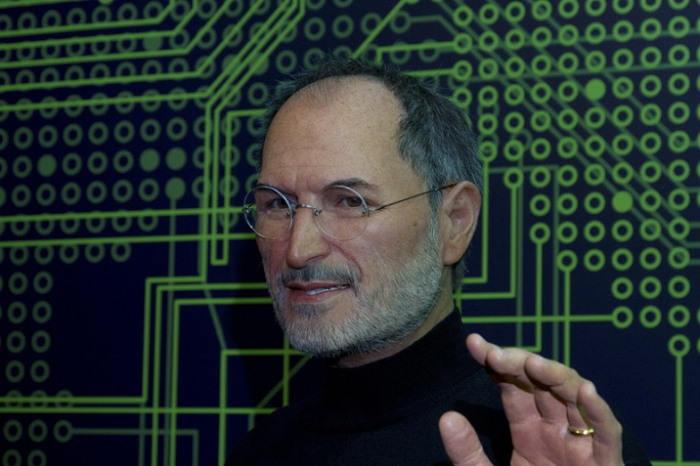
Steve Jobs has shown to the world how to dream and how to achieve your dreams even if there are many obstacles. Students should look up to him because he has proven that dream and perseverance make him a great role model.
Some of his famous quotes were −
"Sometimes when you innovate, you make mistakes. It is best to admit them quickly, and get on with improving your other innovations."
"Being the richest man in the cemetery doesn't matter to me. Going to bed at night saying we've done something wonderful, that's what matters to me."
Without him, the world wouldn't be how it is today!

Related Articles
- Why is air considered as a mixture?
- Why is river Ganga considered as sacred?
- What are some funny memes about Steve Jobs and Bill Gates?
- Why Anger is considered as self-killer/destroyer?
- Why algae is not considered as a plant, although it does photosynthesis?
- Why is the Video Considered as a Powerful Tool in Digital Marketing?
- Why is Petrol considered a mixture?
- Why do we have a different time zones and why GMT is considered as the standard?
- Why are the Methane and LPG considered ideal for use as domestic fuels?
- Why Dante is considered a great poet?
- Why is LPG considered a good fuel?
- Why is biogas considered an ideal fuel for domestic use?
- Why is Pablo Picasso considered a great artist?
- Why is JavaScript considered a loosely-typed language
- What is the merger model and the factors considered?
Kickstart Your Career
Get certified by completing the course
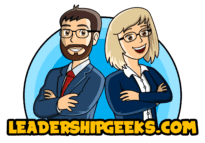
Steve Jobs’ Leadership Style
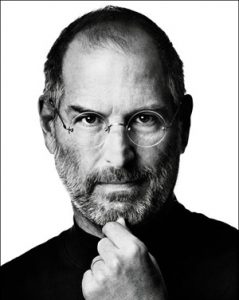
Steve Jobs left behind an incredible legacy: From computers and technology, to music and movies, his influence and innovations revolutionized industries. They continue to shape how we consume information and entertainment, achieve productivity , and communicate with each other in modern times.
With his success in leading Apple, NeXT, and Pixar, there is much we can learn from Steve Jobs as a leader and trailblazer.
In the following sections below, we will look at the 10 most important leadership lessons and traits that can be gleaned from the experiences and enormous successes of Steve Jobs. We will delve into the choices he made as a business mogul in order to better understand how his passion and dedication to his craft can be emulated by anyone looking to enhance their own leadership skills.
NOTE: This post was originally planned to be released as a book, but we decided to release it for FREE here on Leadership Geeks. It’s pretty long — more than 10,000 words actually! So if you’d rather download a nice PDF of it that you can read later offline, you can Buy the PDF here for just $3 . It also helps support our site! 🙂
(Updated April 2019)
The Leadership Style of Steve Jobs: The Top 10 Leadership Traits of the Man Behind Apple, NeXT, and Pixar
Table of Contents
1. Don’t Do It for The Money
Our materialistic society places a premium on financial success. The bigger your salary, the nicer things you can afford, and the more successful you will be considered in your chosen field. While it is not wrong to aim for material success (Steve Jobs, after all, was himself a very wealthy man), doing everything primarily for monetary gain often creates a lifestyle characterized by greed, loss of ideals, and a lack of real fulfillment.
If there is anyone who knows exactly what material success feels like, it is Jobs. He was already a millionaire at the age of twenty-three. His net worth was about ten million dollars at age twenty-four, and this had grown exponentially to a hundred million dollars by the following year. Jobs was one of the youngest ever to make it to Forbes’ list of the richest people. Even more impressive is the fact that he did this without any inherited wealth. By the time he passed away in 2011, his net worth was around $10.2 billion.
Yet, in a 1995 interview, Jobs had this to say:
“You know, (being a millionaire) wasn’t that important, because I never did it for the money. I think money is a wonderful thing, because it enables you to do things. It enables you to invest in ideas that don’t have a short-term payback. At that time in my life, it was not the most important thing. The most important thing was the company, the people, the products we were making. And what we were going to enable people to do with these products. So I didn’t think about the money a great deal. I never sold any stock. I just believed that the company would do very well over the long term.”
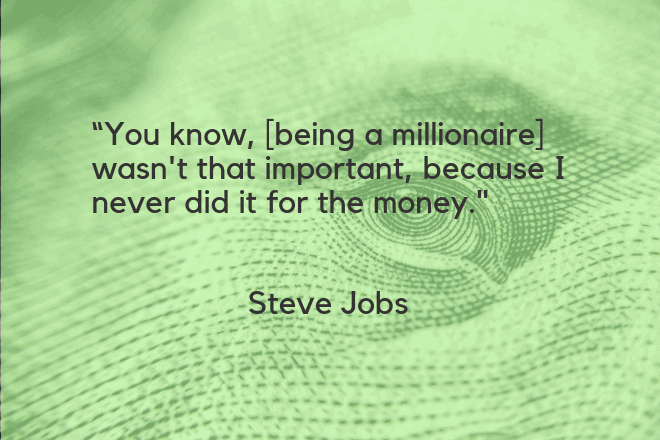
Money is a Tool
Jobs understood that money is neutral. It can enable you to achieve more and make a difference in your spheres of influence. However, money is not the most important thing. Jobs realized early on that it is the people he was working with along with their collective efforts towards groundbreaking consumer products that would eventually give them more satisfaction and a sense of achievement. He was focused more on the pursuit of excellence and the unique experiences of daily life, rather than the fleeting enjoyment that money may bring.
So many people give up their passion or real interests in exchange for a chance to land a more lucrative job or an established career, too often doing work that hardly gives any real fulfillment. The paycheque may be fat, the bank account may be full, but the soul becomes dry, and the spirit soon becomes exhausted from the tedium of it all. On the outside, it may seem like the idealized success story, but a closer look reveals a life that lacks real substance.
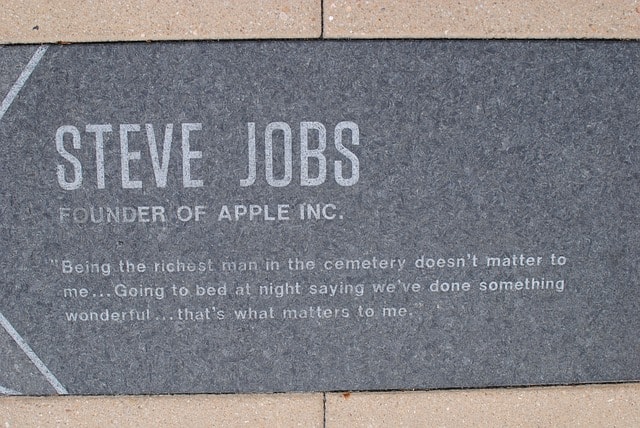
Passion Trumps Money
Steve Jobs had a passion for the wonders of technology and how it can change the world positively. He found a way to channel this passion into a moneymaking venture. Soon, his ideas became reality. Money was pouring in, but he never lost the passion or excitement he had from the very beginning. In fact, it is reported that even when he was very ill and lying in a hospital bed, he was thinking up devices to hold up an iPad in a hospital bed, and proposing ways the oxygen monitors could be better designed.
This leadership trait focuses on the invaluable importance of passion, talent, and creativity over the prospect of a quick buck. Are you making decisions based only on financial returns without regards to the potential impact it may have on the people you work with? Or based on how they may view their role in your organization or enterprise? Are you weighing the advantages of accepting a job offer based on the increase in salary, without any thought to drawbacks such as spending less time with your family.
Finding Meaningful Work
People and relationships are ultimately more important than any other material returns. However, too often we get so enamoured by the promise of wealth and social status that we become willing to give up the more important things in life. As a leader, your mindset must be one that places a premium on the person rather than production.
When money becomes the driving force for all priorities, we lose sight of how much more real and meaningful life can be beyond any material gain. Let your passion and natural inclinations lead you to a career path that is truly suited to who you are as a person instead of mapping out a path with only financial rewards as motivation. In the end, the happiness of seeing your achievements come to life will bring you more satisfaction, beyond anything money can purchase.
Steve Jobs believed it was important for an individual to find what he or she loves, both personally and professionally. Work takes up a major chunk of an individual’s life, and the only way he can be satisfied is to believe the work he is doing is great work. The only way to be able to do great work is to love what you do. If you haven’t found what you love, then keep looking for it. You shouldn’t have to settle; you will eventually find it. Steve Jobs once said that “your time is limited, so don’t waste it living someone else’s life”. Have the courage to do what you love and listen to your intuition.
After a hiatus of nearly 12 years, Jobs returned to Apple in 1997. At that time, Apple was close to bankruptcy. Jobs held a staff meeting, where he explained how important passion was in restoring Apple to its former glory. He said “people with passion can change the world”, and this simple idea is the key to success. In a speech given by Jobs at Stanford University in 2005, he said, “You’ve got to find what you love” and the only way in which you will be able to do great work is to love what you do.
If you aren’t passionate about your own ideas, no one else will be. All successful entrepreneurs are passionate, but it doesn’t necessarily have to be about the product. They can be passionate about their mission , about the influence their products or services have on other’s lives, or they might even be passionate about changing the world. For instance, Steve Jobs was never passionate about computer hardware. Instead, he was interested in developing tools to help people unleash their true creativity. He wanted to enrich the lives of those around him through technology.
Jobs was truly obsessed with design, to the extent that he took a calligraphy course to learn it. He believed that a person should follow their heart and have faith that everything will make sense in the future. Even after he was diagnosed with cancer, Jobs returned to Apple to complete projects that were dear to him. His passion and commitment is the primary reason he proved to be such a great leader and inspiration to many.

2. Set Impossibly High Standards
Whether it is the people he worked with, the products he designed, or his goals for his various ventures, Steve Jobs always raised the bar so high that it often seemed impossible to achieve. While modern culture celebrated mediocrity by accepting the status quo, Jobs strove for something more and the market loved him for it. They knew they were getting more than what the competition could give. The high standards Jobs set for himself became the benchmark for every company he led – Apple, NeXT, Pixar – and the results were obvious.
Jobs, the Perfectionist
It is said that the design team at Apple, the Human Interaction team, had to meet with Jobs every other weekend to present their ideas. Jobs, ever the perfectionist, would usually critique their proposals, ask for a do-over, and have them evaluated again in the same meeting two weeks later. It was constant pressure on the employees, so much so that Steve Wozniak, who co-founded Apple with Jobs, commented that many former employees have said they would never want to work with Jobs again.
However, this constant stress to improve undoubtedly pushed many of these Apple employees to raise their own standards. As a result, Apple products were regarded as among the best in the industry. Jobs’ perfectionism may have turned off many employees who could not stand the pressure, but those who stayed and endured eventually became a part of the Apple technology revolution.
Ken Segall, a former creative director at Apple, who also worked with an ad agency for NeXT, described Jobs as “a client with absurdly high standards”. Segall is the man who coined the ‘i’ in iMac, which is now in many other Apple products such as the iPod and iPhone. He was also behind the famous Super Bowl commercial in 1999 about Apple and the Y2K bug. He goes on to say about Jobs:
“When it came to products, he believed in putting customer experience above all other things. When we had to run multi-page ads, we would have to choose the paper that the ads were printed on. Steve believed because people were going to love the experience of the ad, they would buy more Apple products as it gave them such a high quality. So, Steve showed you that you can have values and run a profitable business.”
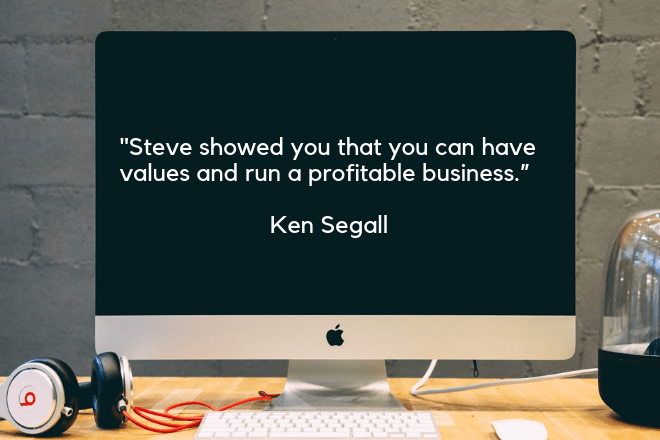
Walking the Talk
Instead of just giving directives, exceptional leaders promote a high standard of excellence by ‘walking the talk.’ The reason why Jobs’ insistence on excellence became part of the culture in his companies is because he also endeavoured to live up to these ideals. People working with him knew he wasn’t exempt from his own high expectations.
In his biography of Steve Jobs, Walter Isaacson also wrote about the very high personal standards Jobs set:
“From his father Steve Jobs learned that a hallmark of passionate craftsmanship is making sure that even the aspects that will remain hidden are done beautifully… ‘I want it to be as beautiful as possible, even if it’s inside the box. A great carpenter isn’t going to use lousy wood for the back of a cabinet, even though no one’s going to see it…you’ll know it’s there…for you to sleep well at night…the quality has to be carried all the way through.’”
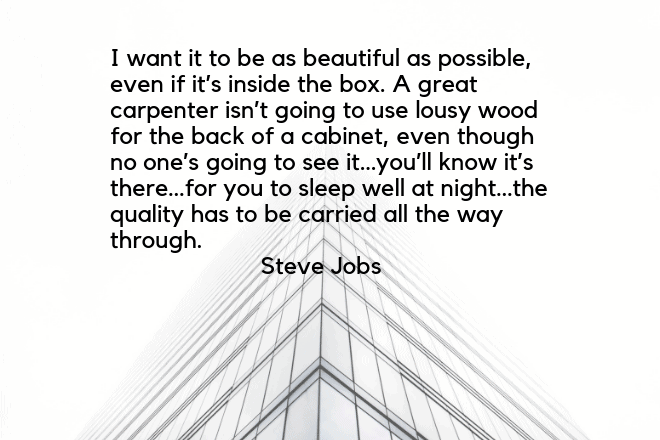
Living Up To Your Own Standards
For many of us, excellence may be something we aim for in the workplace or with colleagues, but these standards are set aside when we’re left alone. How often have you cut corners when no one was looking, or let something slide that otherwise you would not have done had someone been there to scrutinize your work? Jobs’ standard for himself was such that even when no one was around, he insisted on excellence down to the smallest detail.
How you set your personal and professional standards does not need to be an exact replica of Jobs. The standards we set for ourselves are shaped by our backgrounds, influences, and environment. The people we work and interact with constantly will either push us to aim higher or lower. Do those with whom you surround yourself challenge you, or are you finding yourself settling for less because your environment overlooks mediocrity or prioritizes quantity over quality?
Leaders sometimes confuse high standards with rigid, unrealistic codes of conduct or expectations, which is not always correct. What may constitute as “very high” standards for one group may be considered as inferior or insufficient to another. In addition, just because you may think you are strict doesn’t necessarily mean the rules themselves set any reasonably high standards for your organization.
A true leader recognizes that without clearly set standards for performance and excellence in areas of importance, a team will not achieve its full potential. High standards challenge stakeholders to bring their ‘A’ game and come fully prepared. In this area, Jobs clearly embodied a leader who not only set the bar for excellence, but also passed it along to those around him, causing a trend that eventually became the dominant culture in his companies.

3. Hire The Best
In the business world, securing the top talent for your team is a factor that can determine whether or not the venture will succeed. Steve Jobs recognized the necessity of working with staff who are the best at what they do. These are employees who can contribute not just skills and experience, but ideas that will push the organization forward and keep them ahead of the competition.
Jobs once famously quipped, “It doesn’t make sense to hire smart people and tell them what to do; we hire smart people so they can tell us what to do”. He understood that in order to get the most out of his employees’ potential, he needed them to not just perform a role, but also to actively share their opinions, feedback, and vision for improving the company.
Jobs emphasized hiring the very best of the best. He was directly involved in the hiring process and was said to have personally interviewed around 5,000 applicants. This means he was acutely aware of what hiring entailed and how to determine which potential recruits were the best candidates to join his team.
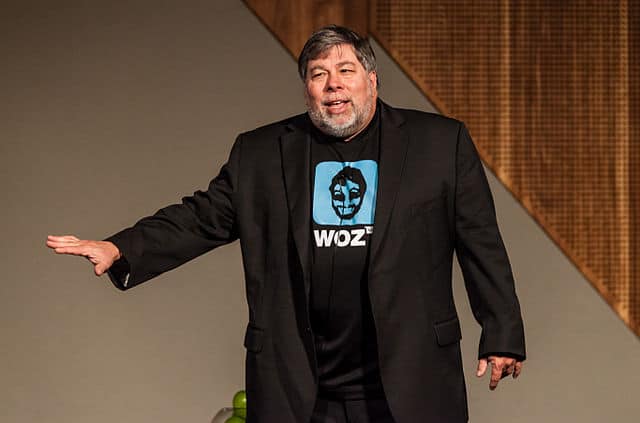
This also underscores how much of a perfectionist Jobs really was. He took time to really build a team that could challenge him and have the same passion he had for innovation. In his autobiography, Jobs says:
“I’ve learned over the years that, when you have really good people, you don’t have to baby them. By expecting them to do great things, you can get them to do great things. The original Mac team taught me that A-plus players like to work together, and they don’t like it if you tolerate B-grade work.”
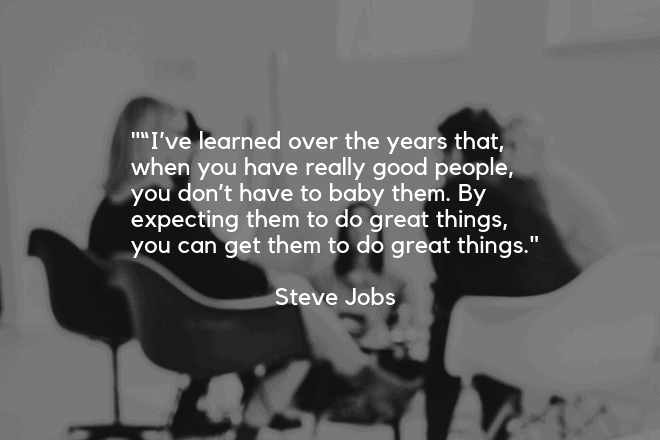
The Ideal Team
While much can be said about the incredible vision, intellect, and innovative spirit of Steve Jobs, he has constantly credited much of his success to the collaborative efforts of his team. He once said, “the secret of my success is that we have gone to exceptional lengths to hire the best people in the world.”
A true leader recognizes the invaluable contributions the people around him can give towards the success of the company or organization. He will work to make the hiring process one that is laser-focused on securing talented, driven, and committed individuals who display top-notch skills and the hunger to learn more.
The ideal team consists of members who each have their own strengths and unique skills to contribute. An effective leader recognizes how to harness these varied skills toward a common goal. He also encourages questions and arguments that push each team member to deliver their best at all times, knowing that the others in the group will expect nothing less.
Why is it important to hire the best? You will be spending a lot of time with your team: conversations, planning sessions, proposal meetings, and product launches. Circumstances will either bring out the best in each of you, or hinder you from moving forward as a team towards bigger goals.
Jobs described it best:
“My model for business is The Beatles. They were four guys who kept each other’s kind of negative tendencies in check. They balanced each other, and the total was greater than the sum of the parts. That’s how I see business: Great things in business are never done by one person, they’re done by a team of people.”
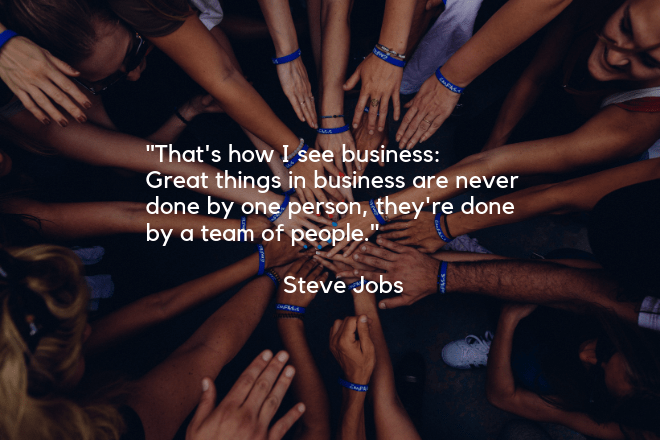
Hiring The Best For Your Company
For most managers, hiring people isn’t something they are required to do, so they aren’t interested in investing their time in refining a management skill they don’t use. Steve Jobs thought otherwise. Hiring the best of employees is integral for improving the overall productivity of the company. Accurate hiring also helps in employee retention and engagement.
In the end, it pays to surround yourself with people who have positive attitudes, and are anxious to grab the next opportunity or discover the next big thing. Their energy will rub off on everyone in the team, and that excitement can be translated positively into effective action that keeps your group a step ahead of the pack.
Leaders should not be scared or intimidated by people who seem too confident, or have the potential to overshadow their own abilities. Rather, a wise leader, such as Steve Jobs, knows that the more he is able to work with the best, the higher his chances will be in improvement, innovation, and becoming the industry leader.

4. Practice Innovation
History is full of stories of trailblazers who dared to dream bigger than their peers and did not stop until they fulfilled their ambition for change. In the areas of science and technology alone, the names of Thomas Edison, Orville and Wilbur Wright, Alexander Graham Bell, Isaac Newton, Nikola Tesla, James Watt, Johannes Gutenberg, Charles Babbage, and Henry Ford are among the most revered worldwide for their revolutionary contributions to society.
When it comes to innovation in modern times, Steve Jobs is credited with shaking up the way we now communicate, consume information, and spend our leisure time. His groundbreaking ideas about smart phones, animated films, and the musical listening experience have dominated the last couple of decades. His vision made Apple and Pixar household names and entrenched the iPod and iPhone as benchmarks for mobile technology.
Finding Inspiration
Where did Steve Jobs get the inspiration for his products? Walter Isaacson, the biographer of Jobs, notes that he drew from a wide range of influences in the humanities harking back to his college years. Early on, Jobs had an intense fascination with Eastern religion, philosophy, design, art, culture and literature. These interests had an impact on the way Jobs viewed technology and how it relates to the human experience.
One of the reasons why Steve Jobs found immense success with the products he released was he somehow found a formula that made these products click with all kinds of people, regardless of age, background, cultural nuances, and geographic location. Jobs was focused on innovations that would enrich people’s lives beyond just selling mere products and services. He knew that no matter how functional a device may be, if it did not speak to the human experience, it would not be a success.
This philosophy became his passion for innovation and creativity. When Jobs came back to Apple in 1996, the company was already producing computers that, while functional, were not seeing much mass-market success. Apple was already on the verge of bankruptcy. However, Jobs somehow found a way to turn things around, and he did this by just going with his gut feel about what would work.
“ Don’t let the noise of others’ opinions drown out your own inner voice,” Jobs said. “And most important, have the courage to follow your heart and intuition. They somehow already know what you truly want to become.”
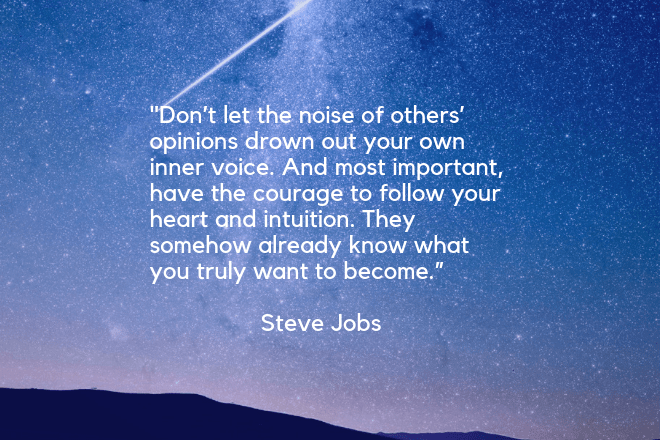
Introduction of the iPod
In 1996, the world already had computers, cellular phones, CD players, and portable media players. However, Steve Jobs had something else in mind: what if these devices could do more? Apple’s Macbook computers soon became known for their sleek designs and powerful capabilities, as Jobs continued to push his team to discover user-friendly features and pack on more processing power than the average user needed at the time. Then the iPod came along and this totally changed the way people consumed music. Instead of lugging their CD collections everywhere, the iPod allowed users to carry hundreds of hours of music on a pocket-sized device. It was an instant hit.

Timing is Everything
The genius of Jobs’ innovations is that they were almost always timed right at the cusp of some major force already about to upend technology or entertainment as a whole. When the iPod came out in 2001, the digital music revolution was already in full swing but in danger of being cut short as the music industry threatened to clamp down on piracy. With the iPod and iTunes, Jobs introduced a compromise that made both music producers and consumers happy: users still paid for the music, but could now choose only the songs they liked and in the mp3 format which they now preferred.
His innovation did not stop there. As cellular phones became more of a fixture in daily life, Apple introduced the iPhone, a high-powered touchscreen smartphone which also housed users’ apps, music, video, and Internet browsing. Once again, it was a resounding success and a game-changer in the crowded mobile phone market. To this day, iPhones are the leader in the smartphone market.

Despite the myriad of features and functions present in Apple devices, Jobs borrowed heavily from the Eastern philosophy of simplicity. This was one reason why so many users were drawn to the user-friendly designs of iPods and iPhones. Jobs once said, “That’s been one of my mantras — focus and simplicity. Simple can be harder than complex; you have to work hard to get your thinking clean to make it simple.”
Forget about the ‘Misses’
While Jobs certainly had many hits, some of his attempts at innovation also produced misses. He was always ready to admit those failures and move past them. “Sometimes when you innovate, you make mistakes. It is best to admit them quickly, and get on with improving your other innovations,” Jobs said.
Few people today would remember the Apple Lisa, the Powermac G4 Cube, the Apple III or the Macintosh TV, much less know what was wrong with them in the first place. Nevertheless, these are among the product failures of Jobs’ career. What he did was to learn from those failures, and capitalize on other products that were successful. As a result, he is remembered more for the products that did make it big.
Innovation in leadership requires risk-taking and a willingness to buck the trend, banking on intensive research and careful study, while having the patience to test various methods and learn from them. Innovative leaders are comfortable with being considered different or crazy because their ideas don’t seem realistic to the casual observer. In the very words of Steve Jobs:
“ Here’s to the crazy ones, the misfits, the rebels, the troublemakers, the round pegs in the square holes… The ones who see things differently — they’re not fond of rules… You can quote them, disagree with them, glorify, or vilify them, but the only thing you can’t do is ignore them because they change things. They push the human race forward, and while some may see them as the crazy ones, we see genius, because the ones, who are crazy enough to think that they can change the world, are the ones who do.”

5. Build a Brand
Today’s consumers are bombarded by marketing messages of all kinds. With all the different media platforms available today – Internet, TV, print, radio, mobile, outdoor – the average person is exposed to all sorts of marketing tactics and strategies. At times be difficult to tell one product, service, or company from the other. This is where branding comes into play.
Beyond just advertising messages, branding seeks to firmly establish a presence by cleverly packaging a lifestyle or experience around a person, company, product, or service. In a bid to set itself apart from the rest of the fold, branding aims to build a unique relationship with the consumer and become instantly recognizable.

Steve Jobs wasn’t just full of energy, innovation, and big ideas. He was also brilliant at marketing and in thinking of strategies that would make his products – Apple, in particular – part of a brand that would be globally recognizable. Jobs was a master of promotion and knew how to build up hype around his product launches. But more than that, he built a brand based on quality, market-leading features, and forward-thinking ideas that challenged the norms of the day.
Jobs was a stickler for quality in everything – from the hiring process, to research and development, to production facilities and the manufacturing process, and the distribution and marketing of his products. It was his belief that customers appreciate quality, and good quality builds a brand in a much more effective way than any sleek marketing campaign can achieve.
“Be a Yardstick of Quality”
“ Be a yardstick of quality. Some people aren’t used to an environment where excellence is expected,” according to Jobs. He knew that if he delivered products with superior quality, anticipated consumer needs, and backed it up with exceptional customer service, users would become loyal followers. These loyal followers would then become his customer base for the next few years, essentially building a brand through positive word-of-mouth and a remarkable track record.
Steve Jobs tapped into people’s dreams, life goals, and ambitions. He designed and packaged his products in such a way that these products would help people fulfill these goals. The brand he created was focused on a certain lifestyle, a feeling of individuality, achievement and self-worth. The products became the tools to reach this lifestyle instead of just the focus of his marketing strategies. Apple commercials – notably, the famous ‘1984’ Super Bowl commercial – resonated with an audience that longed for a respite from the mundane. These ads played right into the ‘hip’ lifestyle with which Apple products became synonymous.
Jobs wanted his products to be accessible even for those who were not as tech-savvy as others. At the same time, he did not want to appear to be dumbing things down or alienating his more sophisticated target audience. He achieved this balance by simplifying everything, from the designs of his laptops, phones, and mobile devices, to easy-to-use graphic user interfaces and interconnected apps across Apple devices. Even the iconic minimalism of Apple stores were part of his branding strategy to showcase quality, high-tech products in a way which was not intimidating to potential customers.
Apple’s products were not entirely new or without inspiration taken from elsewhere. Computers and cellular phones already existed, but Jobs made products that improved on everything these devices could do, and made them more relatable to the common user’s daily goals and dreams. He then marketed them in such a way that they seemed completely new and unique.
Analyze Your Audience
As a leader, learning from Steve Jobs on branding would involve analyzing your audience and knowing their needs, preferences, and goals. What is it they are striving for? How are they working towards their personal dreams and ambitions? More importantly, how can you relate to their life goals and position yourself and your organization to help people achieve what they want in life?
Branding is effective when it is able to successfully enter the audience’s stream of consciousness. It is offering a better way of doing things; a departure from what has always seemed the best way. If what you are providing can make people’s lives better, your message should revolve around these enhancements to your market’s lifestyles rather than just selling products for what they are. In other words: don’t sell features, sell benefits .
Top Quality Can Command Top Prices
Why are many consumers today willing to pay top dollar for Macbooks, iPhones, and iPads? These devices are often more expensive than their non-Apple counterparts, and yet they continue to sell out because they have become symbols of top quality, superior design, and durability. When a Windows computer sometimes freezes or gets bogged down, you can count on your Mac to just keep working. iPhones and iPads work seamlessly even when you have multiple apps running, allowing for multi-tasking and productivity on the go. Customers already know what to expect from the brand.
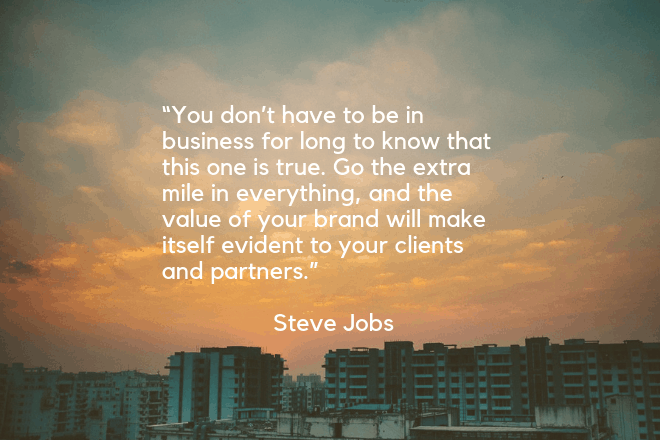
Steve Jobs believed in giving his market more than just a tech gadget for work or play. He tied everything to a superior lifestyle that was fast-paced but enjoyable, productive but relational, effective but with room for new experiences. The result was brand recognition that remains unequaled to this day, resonating in every variation of Apple products that roll out. Why? Because Jobs believed in the power of doing more:
“You don’t have to be in business for long to know that this one is true. Go the extra mile in everything, and the value of your brand will make itself evident to your clients and partners.”

6. Stay Persistent
Steve Jobs faced various setbacks throughout his life, from dropping out of college and lacking a clear sense of direction in his younger years, to being kicked out of Apple in 1985 by the CEO Jobs himself hired. Throughout the many failures Jobs went through in his storied career, the one leadership trait that stands out is his persistence and determination to keep going no matter what.
To be a strong leader, you have to be unwavering in achieving the end goal you have set for yourself and the organization you are leading. People will look to you for direction, especially when the going gets tough, and it seems easier to just throw in the towel and abandon everything. Jobs taught us to practice perseverance in the midst of insurmountable difficulties, building character and finding ways around the problem in order to reach a workable solution.
What Separates Successful Entrepreneurs
Jobs was quoted as saying, “I’m convinced that about half of what separates the successful entrepreneurs from the non-successful ones is pure perseverance. Unless you have a lot of passion about this, you’re not going to survive. You’re going to give it up. So you’ve got to have an idea, or a problem or a wrong that you want to right that you’re passionate about; otherwise, you’re not going to have the perseverance to stick it through.”

There is much to learn from this nugget of wisdom from Jobs. He mentions passion as a key to perseverance, and rightfully so. It is hard for anyone to find the motivation to stick it out with a goal or venture he himself doesn’t have the desire for in the first place. Passion fuels determination and wills the body to keep pushing even when the mind has doubts or fears.
Passion is what keeps a competitive athlete waking up early each morning, training hard and following a strict meal plan in preparation for a major competition. Because the athlete already has that goal of Olympic glory in his mindset, any of the distractions or fatigue that can hinder his dedication are set aside. This passion also moves the doctor who works round-the-clock to find a cure for a yet-incurable disease, or the lawyer who must exhaust all possible legal means to save the life of his wrongfully-accused client facing death row.
Much like adrenaline, when passion courses through a person’s veins, all else seems insignificant when compared to the potential achievement ahead. Jobs had a vision of using technology to make people’s lives better and to connect the world in ways never seen before. Because he had this passion, he viewed any setbacks as temporary, and instead looked for ways to get around roadblocks and reach his destination by whatever means necessary.
This passion doesn’t come overnight. In many instances, it is instilled or enhanced during a person’s formative years. When Jobs was once asked what advice he would share with those who are interested in becoming entrepreneurs, he said, “I’d get a job as a busboy or something until I figured out what I was really passionate about.” Once you know what you are destined to do, you can then set out to take your place in the universe and become that person.
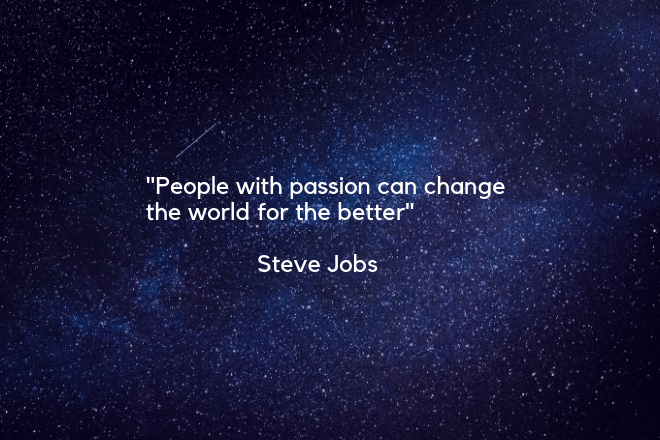
Jobs recognized the revolutionary, life-changing power of passion. “People with passion can change the world for the better,” he said. The most persistent individuals you will find in any industry are the ones who are, slowly but surely, causing ripples of change in their respective homes, communities, workplaces, and social circles. They have tapped into their passion and are using that to drive their determination towards making a positive impact in the world.
Pushing Through During Setbacks
Without Jobs’ persistence, the smartphone industry as we know it now would look totally different. Before the launch of the iPhone, Jobs’ design team at Apple faced many challenges. Calls were dropping, WiFi connectivity problems kept popping up, and other design issues were being discovered right up to the day of the launch. However, Jobs willed his team to keep on with the project, and the iPhone’s success completely changed smartphones and their role in our society.
Jobs kept pushing and striving for his goal even when he was removed from his own company, turning his efforts to NeXT Computers and Pixar. So when the tables turned and he found himself once again at the helm of Apple in 1996, he knew the industry and didn’t need time to catch up. He knew just what consumers wanted, and how to tap into those expectations with just the right products and customer experience.
Setbacks can either make or break you. A weaker individual who found himself suddenly kicked out by his own board of directors, orchestrated by the CEO he himself recruited, would have given up. Not Jobs. When he found himself in this position, he looked at it as an opportunity to grow and learn more. He came back stronger, more mature, and with a renewed passion to “put a ding in the universe”.
How do you react to sudden upheavals or hardships? A mature leader looks at obstacles as building blocks to greater success, rather than hindrances that should just be accepted with resignation. Just like what Jobs did, true leaders recognize that not everything goes according to plan all the time. It is in the difficult situations that test your character as a leader.
Seeing your goals through to the very end is a habit that is consistent with everyone who has ever been successful. It is this level of persistence that lifts someone from a life of mediocrity to extraordinary success. Steve Jobs was one such individual who refused to give up and never took “no” for an answer. Most people thought Job’s dreams were impossible to achieve, but he stuck by his vision.
Persistence is rewarded with results. The leader who perseveres, despite the odds, will inspire those he works with to push their own limits.

7. Manage Controversy
If your goal is to be an effective leader, you must be prepared for the inevitable controversies and negative publicity that sometimes comes with the territory. Regardless of your chosen industry or field of expertise, controversial decisions, rivalries, intense competition, and other not-so-positive scenarios will come up. It is up to you to use these situations to your advantage. In fact, you can even use controversy to strengthen your brand and relate to your target market.
Steve Jobs recognized this early on. As a radical visionary, he knew that many of his ideas would be viewed as extreme by his contemporaries. However, he was ready to take the flak and let the chips fall where they may. He also brilliantly used controversial statements along with marketing strategies against his biggest competitors to create an ‘us-versus-them’ image that related to his audience, and it largely worked for him.
The Conflict with Bill Gates and Microsoft
Jobs’ conflict with Microsoft is now legendary. Jobs started in the tech industry at roughly the same time that Bill Gates co-founded Microsoft with Paul Allen and was making inroads in the computer business. During the early ’80’s, Microsoft and Apple actually worked closely together, and Jobs and Gates were friends outside of professional commitments. However, as they had differing visions for their own ventures, a clash was inevitable.
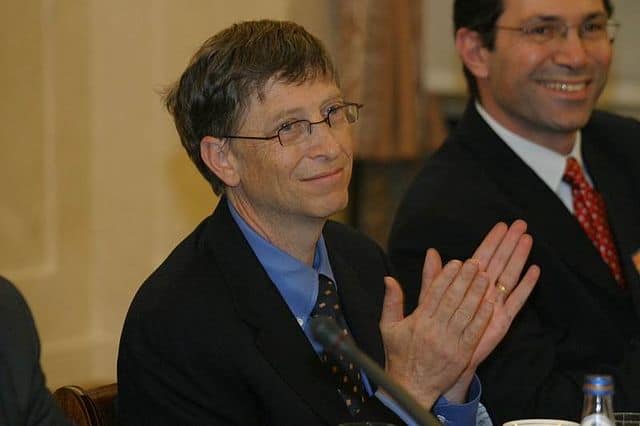
Jobs had a dream of dominating the computer business, and so did Gates. Jobs had expected to achieve dominance through its Macintosh OS, but Gates also had the foresight to recognize that a graphic user interface would soon become the staple in computers, especially for the consumer market. Back then, Microsoft had its DOS operating system, but Gates had his engineers copy from the Macintosh OS and develop their own version: Windows.
The fallout when Jobs found out was pronounced. While they continued to partner together, albeit very awkwardly, the competitive side of the relationship between Jobs’ Apple and Gates’ Microsoft garnered more media attention. It was constant fodder for legions of loyal fans of both companies.
Jobs was very vocal about his views on Microsoft. In a 1996 television documentary entitled Triumph of the Nerds , Job’s said, “they (Microsoft) have absolutely no taste. And I don’t mean that in a small way, I mean that in a big way, in the sense that they don’t think of original ideas, and they don’t bring much culture into their products.”
As for his erstwhile close friend Gates, Jobs had this to say shortly thereafter: “I told him I believed every word of what I’d said but that I never should have said it in public. I wish him the best, I really do. I just think he and Microsoft are a bit narrow. He’d be a broader guy if he had dropped acid once or gone off to an ashram when he was younger.”
In television and print ads, Apple went after Microsoft’s designs, painting their rival as the big bad institution with Apple as the rebel ready to change the system. Who doesn’t remember the Get A Mac ads of the 1990’s, with the PC guy who looks conspicuously like, well, Bill Gates?
The Conflict with Google
When the battle shifted to mobile, Apple’s iPhone was a leader, with Microsoft barely considered a major player. However, it was Google’s Android that soon became the biggest threat to Apple’s mobile dominance. Jobs used this to his advantage, playing up some controversy and depicting Google as the copycat. “I will spend my last dying breath if I need to, and I will spend every penny of Apple’s $40 billion in the bank, to right this wrong. I’m going to destroy Android, because it’s a stolen product. I’m willing to go thermonuclear war on this.”
Using Controversy to Strengthen the Brand
In his talks and media interviews, Jobs always cleverly used these controversies to further strengthen his message that Apple was the original purveyor of ideas in the tech industry, and this endeared him and his products to his loyal cult following. He was able to engineer the message and translate it into sales and brand loyalty.
Now, you may not necessarily have to shore up a massive head-on collision with your competitors or rivals, but the lesson we can glean from Jobs is to manage controversy when it does come up in such a way that you still come out in control. As they say, bad publicity is still publicity, and if the limelight is already in your direction, you can seize that moment to engineer a message that would resonate with your intended audience.
Jobs also recognized that this kind of competition is healthy, because it pressures all sides to step up their game, which then benefits the end users. That said, if you feel you have to show some teeth as a leader, be like Jobs and don’t be afraid to speak up, as he did on several occasions: “We can sit by and watch competitors steal our patented inventions, or we can do something about it. We’ve decided to do something about it. We think competition is healthy, but competitors should create their own original technology, not steal ours.”

8. Develop Your Speaking Skills
Do a quick search on YouTube or any search engine right now on Steve Jobs, and you will be sure to find many video clips of his speeches given during product launches, commencement ceremonies, and other public gatherings. Many of his most memorable quotes come from presentations he made for big product unveilings or lectures he gave to students or business groups.
In his speeches, Jobs seems very much at ease with his material. In reality, he did not start out as a strong public speaker. Jobs realized early on that if he were to be an effective leader, he would have to project an image of steady confidence, and the most striking way to do this would be through his presentation skills, which he set out to improve throughout his life.
Preparation is Key
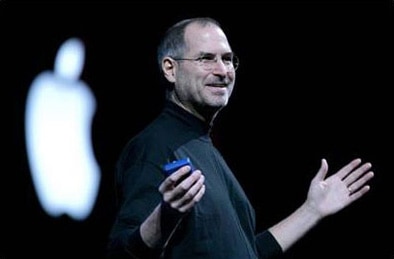
The key to Steve Jobs’ success as a presenter was his preparation. He would spend hours going over his material, practicing at home in front of the mirror and doing rehearsals in front of his team well before he was scheduled to speak. Every detail would be scrutinized, and he wanted visuals, lighting, sound, and effects timed right down to the second. Each public speech was a performance in and of itself, and he knew that his every word would be viewed and studied over and over again. Because of this, he demanded perfection from himself and those around him.
His biggest rival, Bill Gates, knew firsthand how seriously Jobs took his presentations. “I mean, it was just amazing to see how precisely he would rehearse,” Gates is quoted in the book Becoming Steve Jobs. “And if he’s about to go onstage, and his support people don’t have the things right, you know, he is really, really tough on them. He’s even a bit nervous because it’s a big performance. But then he’s on, and it’s quite an amazing thing.”
One of the most popular speeches Jobs ever delivered was a commencement speech he gave at Stanford University in 2005. Jobs is said to have written the speech and rehearsed it at home over and over again, in front of his children, even during dinner time. Laurene, his wife, said she had “almost never seen him more nervous” than during the days prior to that speech. He was focused on making it as precise a performance as he possibly could.
Jobs’ speeches are highly entertaining and equally informative with just the right amount of inspiration thrown in. How did he do it? He drew from his own experiences, packaged his stories into everyday language, and made sure to use colorful descriptions that painted a picture very clearly in the minds of listeners.
Why Public Speaking is So Important
Why is it important to improve your presentation and public speaking skills ? In your many roles in the workplace or your chosen profession, you will be called upon to present your proposal, defend an idea, or simply engage in meaningful discussions about important decisions your group will be making. With the power of presentation, you can deliver a strong case and convince people around you to share your vision and enthusiasm.
Jobs effectively used visuals with short, quotable headlines to drive his message home. In addition, he patterned many of his speeches as stories, mostly with a villain (a problem) and a hero (the solution they have discovered). He focused on the benefits of what he was presenting, such as product features, and he zeroed in on what he knew his listeners would be looking for: things that would improve their personal lives.
Because he prepared and rehearsed incessantly, Jobs avoided reading notes while giving his speeches. Rather, he would keep a list of bullet points to guide him through the presentation, and he knew the material by heart. As a leader, it is important for you to come across as personal and engaging to every single person you are addressing. This can best be achieved by establishing eye contact with as many people in the room as you can. It may seem difficult at first, but with practice, you can improve this skill and become just as effortless as Jobs seemed in his appearances.
Public Speaking is an Art and a Science
Of course, Jobs never forgot to have fun during his speeches. Once, when showing how easy it was to use the maps feature on the iPhone, he prank called a Starbucks number and asked to have 4,000 lattes to go (for his audience). Everyone laughed, and it was an icebreaker that relaxed the audience and also made them more willing to listen to what he had to say. When appropriate, you can lighten the mood or share funny anecdotes that connect you to your listeners and break the monotony of listening to one person speaking for a long period of time.
It’s often said that public speaking is an art. But it is also a science, much like designing machines or troubleshooting complicated computer systems. It requires an understanding of who your listeners are and what interests them, and how you can position your message in such a way that would inspire them to get on your side and accept what you are offering. With intensive preparation and practice, you can also increase your leadership status by excelling in your presentations.
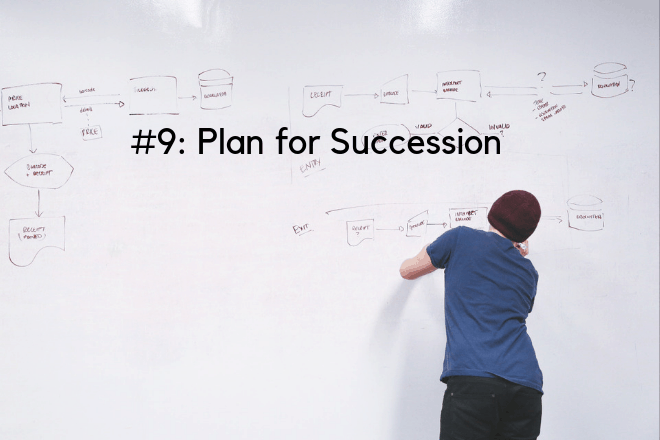
9. Plan for Succession
No matter what your position in your company or organization, you will not last forever in that role. A wise leader prepares for this reality by ensuring there are plans in place for grooming the next leader to take his place, as well as a smooth transition.
Steve Jobs fully understood and accepted the fact that sooner or later, someone would replace him at the helm of Apple. He prepared for this by delegating various responsibilities and training people he knew would be well-equipped to take over. In particular, he worked closely for many years with Tim Cook, Chief of Worldwide Operations for Apple, who would eventually become CEO.
In the book, Becoming Steve Jobs: The Evolution of a Reckless Upstart into a Visionary Leader , it is revealed that succession planning at Apple started even as early as 2004. When Jobs had medical issues in 2004 and 2009, Cook had already taken over indefinitely. Cook knew very well that Jobs was not looking for an exact replica of himself – just a worthy successor.
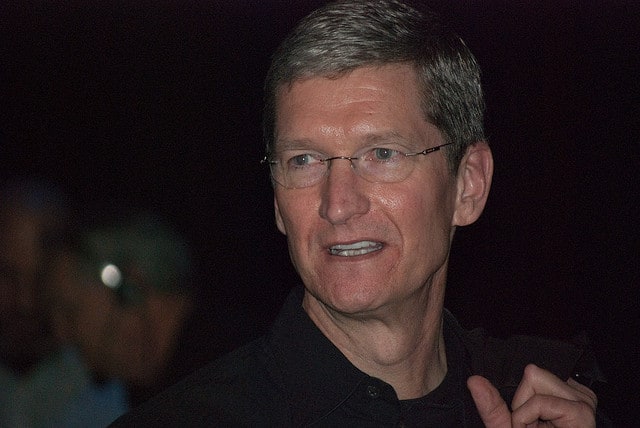
“Apple would not be served well to have a CEO who wanted to or felt like they needed to replace him precisely. I don’t think there is such a person, but you could envision people trying. He knew that I would never be so dumb as to do that, or even feel that I needed to do that.”
Cook also narrated how hands-on Jobs’ approach was in training the next generation of leaders at Apple. “Steve cared deeply about the why,” he told authors Brent Schlender and Rick Tetzeli. “The why of the decision. In the younger days I would see him just do something. But as the days went on he would spend more time with me and with other people explaining why he thought or did something, or why he looked at something in a certain way.”
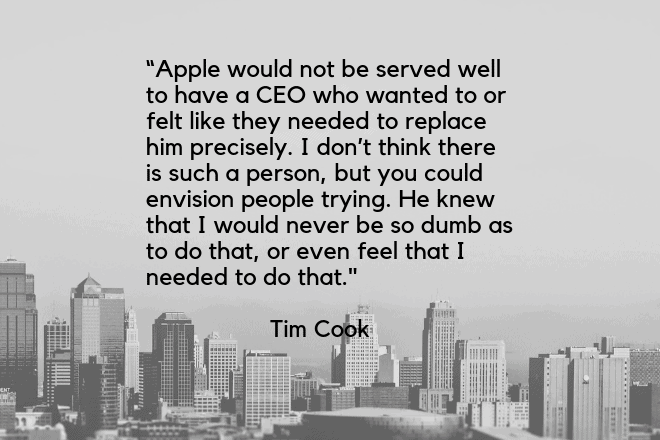
Planning Early On
Because he put a plan in place early on, Jobs was able to personally inculcate many of his strategies and visions to his team, ensuring that the transition, once he was gone, would be one that is smooth and without the feeling of sudden upheaval among those left behind. This succession planning was also one of the reasons why Jobs started Apple University. It would train Apple’s next leaders by reminding them of the company’s past successes and mistakes.
Whoever replaces you will never be able to exactly replicate what you have done or how you run the company and make decisions. This is not the end goal of succession planning; rather, an intuitive leader will train the next person to have the same vision and passion for excellence necessary to lead the organization to greater heights. He should do all of this while staying true to the established brand and delivering promises to the target market as well as stakeholders.
It can take years to find someone who fits this role. However, it is more than likely the ideal candidate is someone already within your team who understands the culture and has been through most of the ups and downs to know why certain decisions are made, and how priorities are set. Jobs had the advantage of actually being able to personally mentor Cook well before he stepped down, so he knew his company would be in good hands.
Giving Leadership Opportunities
This need not be an elaborate task. You may be able to creatively include this in your regular activities as a way to train next leaders and also see potential team members who have that drive you are looking for. During proposals or presentations, you can delegate assignments and see which team members display the passion and attention to excellence you are looking for. Spread out big projects across your workforce and look for those natural-born leaders who take charge and become the key drivers in their respective circles.
Leaders plan for the future, and succession is an important part of that. To this day, many in the business community consider Steve Jobs’ handover to Tim Cook as one of the more successful transitions in corporate America because it involved long-term strategy and personal mentoring. It was this careful planning and vision that enabled Jobs to resign with confidence and send out this message as he stepped down:
To the Apple Board of Directors and the Apple Community: I have always said if there ever came a day when I could no longer meet my duties and expectations as Apple’s CEO, I would be the first to let you know. Unfortunately, that day has come. I hereby resign as CEO of Apple. I would like to serve, if the Board sees fit, as Chairman of the Board, Director and Apple employee. As far as my successor goes, I strongly recommend that we execute our succession plan and name Tim Cook as CEO of Apple. I believe Apple’s brightest and most innovative days are ahead of it. And I look forward to watching and contributing to its success in a new role. I have made some of the best friends of my life at Apple, and I thank you all for the many years of being able to work alongside you. Steve

10. Be Inspired
In 1996, Steve Jobs was quoted, “Picasso had a saying — ‘good artists copy; great artists steal’ — and we have always been shameless about stealing great ideas.” Yet Jobs and his company, Apple, protected their patented ideas furiously, suing Microsoft and HP in 1988 for alleged copyright infringement (regarding Windows and New Wave’s similarities to the Macintosh and Lisa). More recently, Apple also filed numerous lawsuits against Google’s Android operating system, specifically targeting Samsung, HTC, and Motorola for their similarities to the iPhone and iPad.
So what did Jobs really mean when he bragged about how they stole great ideas? When Phil Schiller, Apple’s Senior Vice President of Worldwide Marketing, was asked to explain this statement by Jobs, he said:
“I think what he meant by ‘steal’ was you learn, as artists have, from past masters; you figure out what you like about it and what you want to incorporate into your idea, and you take it further and do something new with it. I can see why people might confuse that with the current use people have for that phrase. You don’t just say, ‘I want something that looks just like yours and I’m going to sell it too.’”
Jobs, it appears, was referring to taking inspiration from others and making their ideas your own in order to create something new, rather than just copying ideas and then passing them off as yours. When you take what works for others, tweak it to make improvements while adding more value and features, you are no longer just stealing or copying from others, but improving on past successes and creating new ideas altogether.

Make the Wheel Better (Don’t Reinvent It)
As mentioned in previous chapters, computers, mobile phones, and other devices already existed when Jobs entered the picture and started to revolutionize design. He set to make these devices more user-friendly, better-designed, as well as more relevant to their modern life. This is why he is still regarded as a leader in innovation. He may have borrowed ideas from those around him, but he executed better and pushed the boundaries of creativity and functionality, blending them into well-loved consumer tech products.
This recognition of the value of culling ideas from other inspirations may have come from Jobs’ love for art and music early in life. He described this artistry in an interview with the Smithsonian:
“I think the artistry is in having an insight into what one sees around them. Generally putting things together in a way no one else has before and finding a way to express that to other people who don’t have that insight so they can get some of the advantage of that insight that makes them feel a certain way or allows them to do a certain thing. I think that a lot of the folks on the Macintosh team were capable of doing that and did exactly that.”
As a leader, you should not be trapped in a bubble of your own ideas and perspectives. This is a dangerous position that hinders growth and limits your potential for expansion. Rather, you should always be learning and open to fresh ideas from others around you with more experience, or who have made errors in the past and have learned from them. There is much you can learn from networking with peers, attending seminars or business lectures, or reading up on current events and biographies of influential personalities who can add to your knowledge.
Borrow from the Best
People are no longer discovering new musical notes, and yet we continue to hear great new music using those very same musical patterns. Why does it sound fresh to our ears? It is because musicians and songwriters are simply figuring out new ways to combine past influences with their own melodic patterns and rhythmic combinations, coupled with lyrics that speak to the human experience.
It is ironic that while Jobs mentioned that he got his famous quote from Picasso, the painter himself was said to have never uttered those exact same words. Rather, the quote seems to have been passed along in various iterations from T.S. Eliot, Igor Stravinsky, and William Faulkner. Funny enough, the very idea being espoused by Jobs – building on the great ideas of others – seems to have found a perfect example in the question of who really said this line originally.
However, whether it was Picasso or Eliot, the lesson remains and that is to be a receptacle of great, positive ideas you will find every day. These inspirations may come from your family, friends, colleagues, peers, perhaps even your closest competitors. Build on these concepts, add your own touch, and expand your horizon as an effective leader.
Conclusion: Leadership Is About Leaving a Legacy
Steve Jobs was an incredible individual who revolutionized the digital world. His ideas will continue to influence several generations of innovators across the world. His ideology, charisma, vision, and dynamic nature have managed to revolutionize the way technology has been integrated into our daily life. He was not only a great innovator, but also an exceptional leader. He was the founder of Apple, one of the most successful companies in the world, and was also able to lead Pixar and several other organizations to success. Jobs truly believed that passion is that one thing that has the power to change the world.
Our Role in the Universe
More significantly, Jobs recognized the sobering, but all-important truth, of the preciousness of time and the urgency of leaving a positive impact on the world. In a public speech, he once declared, “Everyone here has the sense that right now is one of those moments when we are influencing the future.” You may not think of it much, but your actions as a leader now have a ripple effect on the lives of people around you for years to come.
In his visionary designs and innovations, Jobs always looked to the future, knowing well that his work would become the framework for even greater, grander achievements in the generations to follow. This is why he was known as a perfectionist who obsessed over the smallest details, and demanded excellence in every aspect of operations. He was acutely aware of his finite role in the universe, and wanted to make the most out of it in the limited time given to him.
When Jobs Was Nearing The End
His acceptance of the inevitability of death gave him a sense of urgency because he felt he had so many dreams to turn into reality. According to Jobs, “Remembering that you are going to die is the best way I know to avoid the trap of thinking you have something to lose. You are already naked. There is no reason not to follow your heart.”
Jobs was aware that his life was ending, and that he had to make it all count. In his speech at Stanford, he said that “all external expectations, all pride, all fear of embarrassment or failure-these things just fall away in the face of death, leaving behind only what is truly important”. Death is the best motivation there can ever be, and there is no reason why you shouldn’t follow your heart when you know that death is unavoidable. All those dreams that seemed silly — maybe it’s time that you start doing something to turn them into reality.
The Impact of Steve Jobs
The people who have made the most impact in our world are the ones who were looking beyond what they can see with their own eyes, to a future that was better and greater than what they could have imagined. This is what ignited their passion to invent automobiles, airplanes, electric lighting, telephones, wireless communications, printing presses, industrial equipment, vaccines and computers. Their legacy lives on to this day because what they focused on were ideas that transcended the physical limitations of their time.
How much of an impact will Steve Jobs have on future generations? It remains to be seen, but it is safe to surmise that his immediate impact – revolutionizing technology, communication, and entertainment – will continue to grow as the next generation of innovators and dreamers continue on the path that Jobs and others have forged.
How Will People Remember You?
The question you should ask yourself now is: “How will people remember me when I am gone?” Your legacy, or how you lived your life or made your mark, should matter more than any material wealth accumulated or professional achievements. Every little thing you are doing now has an impact on the future, and how you will be remembered.
Your leadership in your immediate circle will also be your legacy; your contribution to your community. Use your time wisely, enhance your skills, make the most of the opportunities presented to you, and you will have lived life the way Steve Jobs did:
“We’re here to put a dent in the universe. Otherwise why else even be here?”
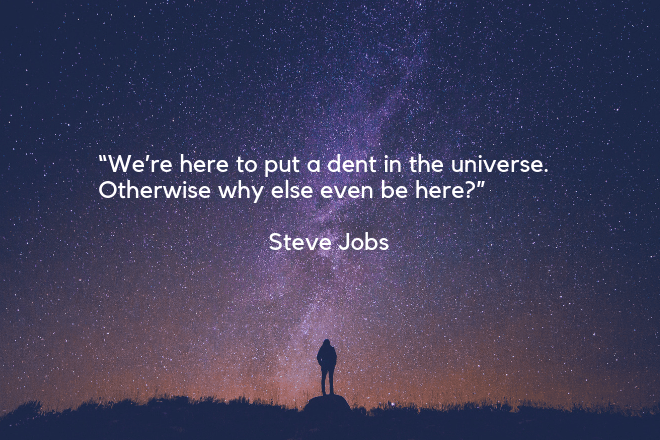
Steve Jobs was an inspirational leader who managed to influence everyone around him with his confidence, adaptability, vision, and ability to think outside the box. After reading this article, we hope you find yourself inspired to be a better leader. Follow the lessons in these posts and you’ll be one step closer to unlocking your true leadership potential.
Remember: becoming a great leader isn’t something that can be done overnight; it takes constant daily practice. As Jobs said, “Stay Hungry. Stay Foolish.” – keep challenging yourself, take risks and remember that the only limits that exist are those you place on yourself.

If you liked this post, share it!
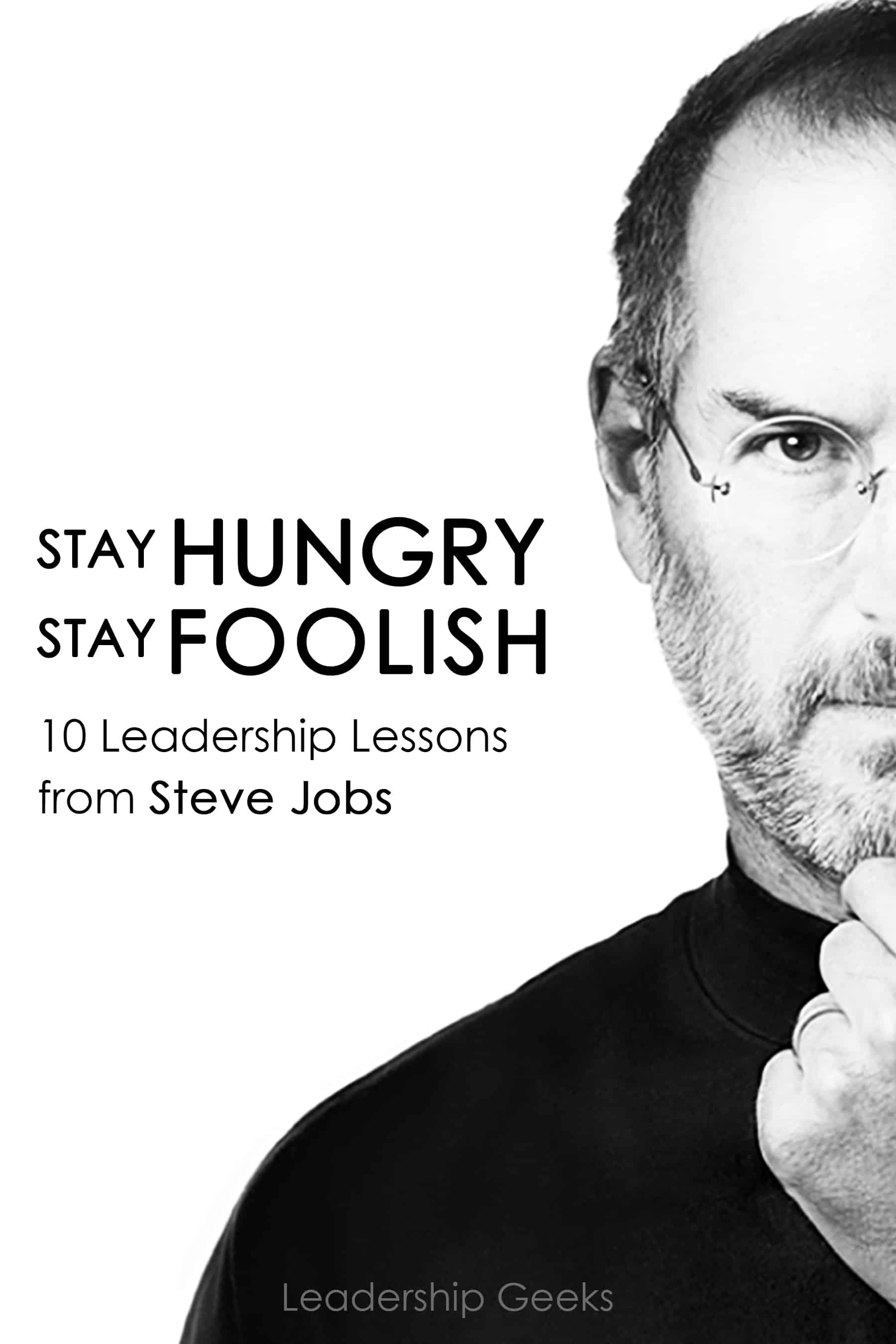
<A HREF=”http://ws.amazon.com/widgets/q?ServiceVersion=20070822&MarketPlace=US&ID=V20070822%2FUS%2Fleawityou-20%2F8001%2F5ac62101-5ad4-4a63-a6d5-d2b28961e331&Operation=NoScript”>Amazon.com Widgets</A>
Wikipedia : A highly detailed account of Job’s life Fortune.com : An interesting long read about Steve Jobs
Steve Jobs by Walter Isaacson
An immensely comprehensive, thoroughly researched and well-written biography by Walter Isaacson brings us a candid and detailed overview of Steve Jobs’ captivating life. Read the worldwide bestseller which inspired the major motion picture Steve Jobs.
Steve Jobs: The Man Who Thought Different by Karen Blumenthal
With a parallel overview of the evolution of computers, Karen Blumenthal follows the extraordinary journey of the genius behind Apple. From his parents’ garage to the forefront of technology, Steve Jobs pushed the limits of success in every way.
Becoming Steve Jobs: The Evolution of a Reckless Upstart into a Visionary Leader by Brent Schlender
Breaking down all the stereotypes, myths and stories surrounding Steve Jobs, Brent Schlender managed to create a uniquely insightful book about one of the greatest minds in modern history. Examine the visionary behind some of the most coveted products around the world.
Steve Wozniak, co-founder of Apple Computers. Photo used under creative commons, from https://commons.wikimedia.org/wiki/User:Nichollas_Harrison
Tim Cook photo by Valery Marchive (LeMagIT) – Flickr, CC BY-SA 2.0, https://commons.wikimedia.org/w/index.php?curid=16228490
Bill Gates and Steve Jobs often butted heads over the years. Photo via CC licence: GFDL 1.2, https://commons.wikimedia.org/w/index.php?curid=2480672
Steve Jobs Photo via creative commons: https://www.flickr.com/photos/detroity2k/
Should Steve Jobs Be Considered A Role Model?
No human being who has walked this Earth has ever been perfect. If you were to look closely into the lives of some of the most revered figures in history you would find a few things that might make you reevaluate how you see them. There may be a few cases of marital indiscretion, a hushed up abortion or a brutal temper only shown behind closed doors to loved ones. Even those who have done very little wrong can still fall short if we judge them too harshly. With that in mind, this essay considers the life of Steve Jobs with the consideration of whether or not his example should be followed.
A role model
Being rejected at birth can be a difficult experience. Jobs parents wanted to get married but his mother’s father disagreed. They gave him up for adoption instead and later got married to have his full siblings. His adopted parents loved him and raised him as their own and even fostered his natural gift for building things. He met people who were similarly inclined from as early as high school and with their assistance he founded companies that would go on to change the world we live in. He took information from sources that more linear thinkers might not have considered and used it to create in unique ways. When he was diagnosed with pancreatic cancer, he used his last days to come to terms with his predicament and inspired many others who were dealing with harsh situations through his words. From this perspective he truly is worthy of being looked up to.
A cautionary tale
From early on in his career, Steve Jobs showed a willingness to deceive others to get his own way. Some of the ideas he presented to others as his own were actually created by one of his contemporaries and he outright lied about his qualifications in a few interviews. People who worked with him will attest that he had a bit of a means streak and often lost track of his temper. Despite delving deep into meditation his products actually do more to foster materialism in the world as they are among the most expensive. Some might still see these as traits of a good role model but room exists for argument.
It is easy to paint people as nicer than they are after death. Jobs was human like the rest of us.
Popular Blogs
- My Essay Geek
- US Essay Writers
- Writing Essays
Latest News
- Choosing topics about US government
- Fresh ideas for a film essay
- Writing an argumentative paper on justice
- Where to find free HRM papers
- Selecting your writing company
- Custom writing assistance
- Free compare & contrast papers
- Fresh topics on Romeo and Juliet
- Creating a problem solving essay
- Counseling paper examples
- Elementary school persuasive writing
- How to overcome procrastination
- Definition paper templates
- Writing on environmental problems
- Using English paper samples
- Ethnographic essay topics
- How to find a competent writer
- Choosing cause & effect topics
- Topics on emotional intelligence
- Choosing a writing agency

IMAGES
VIDEO
COMMENTS
Was Steve Jobs a Role Model for Leaders? by. Darren Overfield and Rob Kaiser. October 01, 2012. Judging from the onslaught of books, articles, and blog posts extolling Steve Jobs' virtues and ...
Summary. Reprint: R1204F. The author, whose biography of Steve Jobs was an instant best seller after the Apple CEO's death in October 2011, sets out here to correct what he perceives as an undue ...
You are free to use it as an inspiration or a source for your own work. Among all business leaders in recent times, Steve Jobs is arguably the best example of the fact that perseverance commands success. Steve Jobs was considered a difficult boss at Apple before he was ousted but when he returned, there was little change in his leadership style ...
Apple Inc. is a company with one such success story. Its co-founder, the late Steve Jobs, is, without doubt, my role model in the business and management world. Mr. Jobs overcame major challenges and extreme adversities in his life to become the CEO of one of the largest technology companies in the world (Lemke, 2007).
The nearly three weeks since Steve Jobs's death has been like an extended tribute to the first global head of state. The memorial ceremonies worldwide, the special commemorative issues and ...
Mr. Jobs ended his commencement talk with a call to innovation, in one's choice of work and in life. Be curious, experiment, take risks, he said. His admonition was punctuated by the words on ...
Steve Jobs' personal life is also a manifestation of improvement of the past mistakes. Starting with his days at the elementary school where he had difficulties coping with the school system to the extent of taking bribes so as to read. (O'Grady, 2008) That reflected on the challenges he experienced.
Steve Jobs has always been considered an anomaly in management; his leadership style was something to admire or to criticize, but definitely not to replicate. He did not fit into the frameworks of ...
Steve Jobs As A Role Model. 1371 Words6 Pages. John Quincy Adams once said, "If your actions inspire others to dream more, learn more, do more and become more, you are a leader.". An organization functions effectively and efficiently only when the efforts of all the workmen in it come together. This requires a leader.
Case study: Steve Jobs as a transformational leader Steve Jobs is an example of a leader who is often associated with transformational leadership in par, ticular when it comes to his charismatic and inspirational qualities (e.g. Bryant, 2003; Bass and Riggio 2005)., A simple internet
Steve Jobs was certainly a willful and driven leader, and the products and services he directed his companies to develop and commercialize changed the way many of us live, as well as the course of a diverse set of industries, including computing, publishing, movies, music, and mobile telephony. At the same time, Jobs's leadership style was ...
technology innovation. This dissertation then looked to discover the main components of Jobs' leadership style. After an extensive leadership theory review to create a baseline of understanding of effective leader concepts, the study examined the leadership style of a dynamic and influential leader in history, Steve Jobs.
This speech showed the greatness of Steve Jobs, being a role model, whose views made a breakthrough in every industry he touched according to the words of the students listening to it. That is the definition of how great a man is and how much he is revered, even after a long time. Jobs was a genius who put meaning into his every move, making ...
Steve Jobs is a great role model for many budding entrepreneurs, business people, and great leaders all over the world. Steve has many innovations in his name. He is the co-founder of the Apple company and created one of the most popular, high tech phones in the world. He has started his own company at a very young age.
Steve was and still is a role model for many struggling entrepreneurs, ousted business leaders, college drop-outs, adoptees, and disease-fighting people who could relate to his journey.
Steve Jobs once said that "your time is limited, so don't waste it living someone else's life". Have the courage to do what you love and listen to your intuition. After a hiatus of nearly 12 years, Jobs returned to Apple in 1997. At that time, Apple was close to bankruptcy.
Essay On Beowulf Is A Role Model. With everything considered, Steve Jobs fits the role of a role model exceptionally well. The legacy he left behind will be remembered for many centuries and may possibly be studied like the epic poem, Beowulf. As a role model, Steve Jobs shows that to be the best is to be intelligent. ...
Steve Jobs was a computer designer, executive and innovator, as well as an all-around role model for many people in both their businesses and their personal lives. As the cofounder of Apple Computers and former CEO of Pixar Animation Studios, he revolutionized the computer and animation industries, amassing a fortune worth $10.2 billion at the ...
1) PERSISTENCE LEADS TO SUCCESS. Jobs taught me that if I stay in the game long enough and keep working at it, I would be successful. I consider myself a huge Apple fan. For Apple fans that have ...
Arguments usually use a fact to support a claim. Steve Jobs uses his opinion and supports it with history. This is also called "ethos or pathos". Which creates more personal information for himself that makes more interest in his audience. This often makes people look at him as a role model.…. 762 Words.
This essay sample was donated by a student to help the academic community. Papers provided by EduBirdie writers usually outdo students' samples. These days I am facing the lack of having a role model that I could learn from and from which traits I could borrow. Steve Jobs was indeed a person who left a big footprint on the planet Earth, so I ...
With that in mind, this essay considers the life of Steve Jobs with the consideration of whether or not his example should be followed. A role model. Being rejected at birth can be a difficult experience. Jobs parents wanted to get married but his mother's father disagreed.
Staying Hungry, Staying Foolish: Academic Reflections on the Life and Career of Steve Jobs. The 2011 death of Steve Jobs, Apple CEO and cofounder, generated a flood of articles in the popular press acknowledging his influence on the design and delivery of consumer products that changed the way multiple generations work and play.